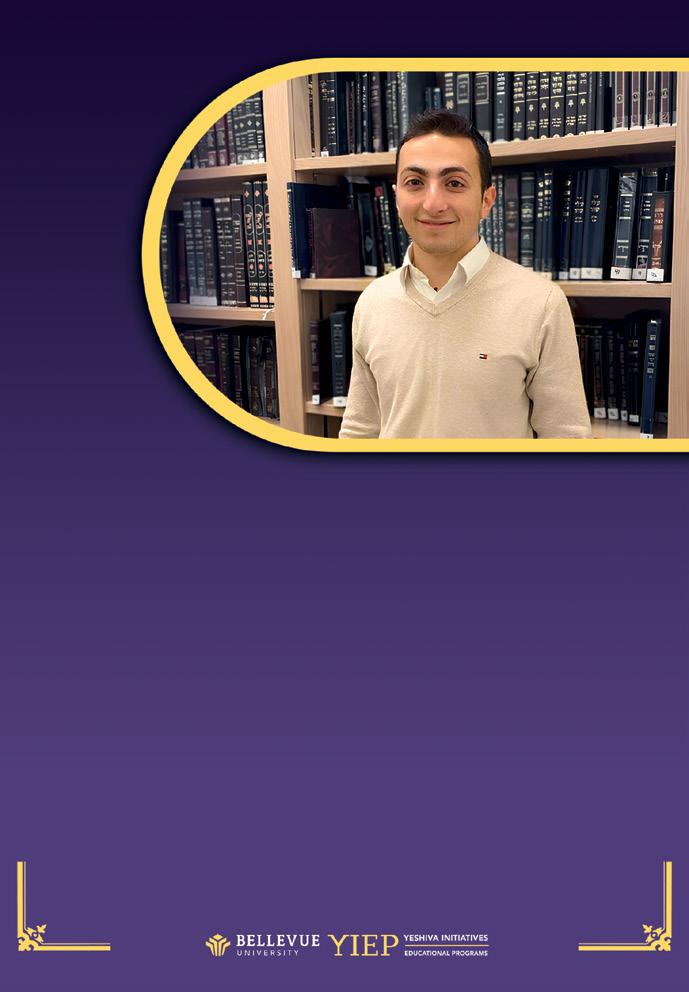SHABBAT



Purim on Motzaei Shabbat Rabbi Daniel Mann Pg 52
Answering the Call Dr. Ariella Agatstein Pg 66
Purim Laws and Customs: A Quick Review Pages 50-51

SHABBAT



Purim on Motzaei Shabbat Rabbi Daniel Mann Pg 52
Answering the Call Dr. Ariella Agatstein Pg 66
Purim Laws and Customs: A Quick Review Pages 50-51
04
Dear
56 Checking in with Ourselves Three Times a Day
Rabbi Aaron Goldscheider
60 Supervision in the Time of Corona
Rabbi Gideon Weitzman
62 Halachic Responsa from the Battlefield
66
Rabbi Moshe Bloom
Answering the Call
Dr. Ariella Agatstein
70 When Ignorance is Bliss - An Insight info the Celebration of Purim
Rabbi Eliyahu Safran PURIM
74 The Y-Files Weekly Comic Netanel Epstein
See TorahTidbits.com > Individual Articles for this week's Dvar Torah by Rabbi Moshe Hauer
IMPORTANT REMINDERS
Last Opportunity to Say Kiddush Levana until: 15 Adar Bet/ Sun. night March 24
Taanit Esther is Thursday March 21. The fast ends at 6:09pm (Jerusalem)
The Shabbat before Purim we add the Torah reading of Zachor in which we are commanded to remember the evil of Amalek. According to many Halachic authorities, there is a Biblical requirement to hear the special Zachor reading. Please see page 50 for Purim laws and customs.
“For you shall not bring any leaven or any honey as an offering by fire to G-d” (2:11)
What is the message of the Torah by the meal offering that leaven and honey are prohibited?
The Menachem Tzion (Rabbi Menachem Mendel Torem from Reminov, Poland 1745-1810) answers that the pasuk is guiding us on how to react in certain situations. We are to refrain from acting in an extreme fashion. Leaven is too sour, and honey is too sweet. Neither are acceptable by G-d. The Jerusalem Talmud (Chagiga 2:20) states: “The Torah is comparable to two roads, one leading towards considerable heat, the other leading toward excessive cold. To adhere to one road would result in death by heat, while the other would end with death by freezing. What path to choose? Take the middle route.”
Maimonides also instructs us this concept based on an earlier verse in the Torah. “And the tree of life was in the middle of the garden.” (Bereishit 2:9) - )ט:ב תישארב( ןגה ךותב םייחה ץעו
The favored path of life is that is the one that neither has overreactions nor underreactions in any given situation. Shabbat Shalom
All Times According to MyZmanim (20 mins before Sunset in most Cities; 40 mins in Yerushalyim and Petach Tikva; 30 mins in Tzfat and Haifa)
Daf Yomi: Kidushin 69
OU Advocacy OU Israel MITCHEL R. AEDER, PRESIDENT OF THE ORTHODOX UNION Yehuda Neuberger, Chairman of the Board, Orthodox Union | Dr. Josh Penn, OU Kashrus Commission RABBI MOSHE HAUER, EXECUTIVE VICE PRESIDENT | RABBI JOSHUA M. JOSEPH, ED.D.
EXECUTIVE VICE PRESIDENT & CHIEF OPERATING OFFICER Rabbi Dr. Tzvi Hersh Weinreb, Exec. V.P. Emeritus
OU KOSHER: Rabbi Menachem Genack, CEO/Rabbinic Administrator OU Kosher | Rabbi Moshe Elefant, COO/Executive Rabbinic Coordinator ISRAEL: Rabbi Yissachar Dov Krakowski, Rabbinic Administrator | Rabbi Ezra Friedman, The Gustave and Carol Jacobs Center for Kashrut Education/ Deputy Rabbinic Administrator
Headquarters: 40 Rector St. 4th floor, New York, NY 10006 212-563-4000 website: www.ou.org
Editor Emeritus: Phil Chernofsky
Editor: Rabbi Aaron Goldscheider | aarong@ouisrael.org
Advertising: Ita Rochel | 02-5609125 or ttads@ouisrael.org
Website: www.torahtidbits.com
Not getting enough TTs? Too many? None at all?
Contact our DISTRIBUTION 050-577-2111 • ttdist@ouisrael.org
Ranges 11 days Wed - Shabbat
Oct x - x / x - x Cheshvan
Ranges 11 days Wed - Shabbat* March 20 - 30 / 10 - 20 Adar Bet
Earliest Tallit and Tefillin 4:52 - 5:39
Earliest Tallit and Tefillin x:xx - x:xx
Sunrise 5:42 - 6:30
Sunrise x:xx - x:xx
Sof Zman Kriat Shema x:xx - x:xx
Sof Zman Kriat Shema 8:44 - 9:36
Magen Avraham x:xx - x:xx
Magen Avraham 8:08 - 9:00
Sof Zman Tefila 9:45 - 10:39
(According to the Gra and Baal HaTanya)
Sof Zman Tefila x:xx-x:xx (According to the Gra and Baal HaTanya)
Chatzot (Halachic Noon) x:xx - x:xx
Chatzot (Halachic Noon) 11:46 - 12:43
Mincha Gedola (Earliest Mincha) x:xx - x:xx
Mincha Gedola (Earliest Mincha) 12:17 - 1:14
Plag Mincha x:xx - x:xx
Sunset (Including Elevation) x:xx - x:xx
Plag Mincha 4:34 - 5:39 Sunset 5:54 - 7:01
*Please note: we move the clocks ahead one
Seymour J. Abrams • Orthodox Union Jerusalem World Center • Avrom Silver Jerusalem College for Adults • Wolinetz Family Shul • Makom BaLev • Birthright • Yachad • NCSY in Israel • JLIC in Israel • Camp Dror • Pearl & Harold M. Jacobs ZULA Outreach Center • The Jack Gindi Oraita Program • OU Israel Kashrut
STUART HERSHKOWITZ, PRESIDENT OU ISRAEL
Zvi Sand / Yitzchak Fund: Former Presidents, OU Israel | Rabbi Emanuel Quint z”l, Senior Vice President | Prof. Meni Koslowsky, Vice President
VAAD MEMBERS:
Michael Elman | Yonatan Frankel | Yitzchak Fund | Daniella Hellerstein | Stuart Hershkowitz | Jeremy Lustman | Meir Raskas | Atara Reichel | Zvi Sand | Norman Schmutter | Mark Schneider | Esther Williams
RABBI AVI BERMAN, EXECUTIVE DIRECTOR, OU ISRAEL
David Katz, CFO, OU Israel | Natan Kandler, COO, OU Israel | Chaim Pelzner, Director of Programs, OU Israel | Rabbi Sam Shor, Director of Programs, OU Israel Center | Rabbi Sholom Gold zt"l, Dean, Avrom Silver Jerusalem College for Adults 22 Keren HaYesod <> POB 1441 <> Jerusalem 9101032
phone: (02) 560 9100 | fax: (02) 561-7432
email: office@ouisrael.org
website: www.ouisrael.org
Founders and initial benefactors of the OU Israel Center: George and Ilse Falk a"h
Torah Tidbits and many of the projects of OU Israel are assisted by grants from THE JERUSALEM MUNICIPALITY
OU Israel, Torah Tidbits does not endorse the political or halachic positions of its editor, columnists or advertisers, nor guarantee the quality of advertised services or products. Nor do we endorse the kashrut of hotels, restaurants, caterers or food products that are advertised in TT (except, of course, those under OU-Israel hashgacha). Any "promises" made in ads are the sole responsibility of the advertisers and not that of OU Israel, the OU Israel Center , Torah Tidbits.

Parshat Zachor is a very meaningful Shabbat every year, but this year people will be having a different feeling when they listen to the pesukim in shul than they have in past years. Remember what Amalek did to us. Memory is something we’re acutely aware of right now. After October 7th, for the first month, we were shocked and traumatized. There was no issue remembering Hamas’ atrocities. As time passes, the need to remember becomes urgent. We still have soldiers fighting and thousands of people recovering from injuries. We still have 134 men, women and children held hostage in Gaza. The nation still has wives and children waiting for their husbands to come home, fathers and mothers waiting for their children to come back from war. We still have over 100,000 people displaced from their homes.
This week, Am Yisrael received the tragic news that Captain Daniel Perez was confirmed dead. Many of us were praying for Daniel HY”D and know his parents, Rav Doron and Shelley. Rav Doron (Executive Chairman of the Mizrachi World Movement) is a dear personal friend and someone who I make sure to speak to our Israel solidarity
RABBI AVI BERMAN Executive Director, OU Israelmissions. When the news came out, I received message after message from the many people who heard Rav Doron speak about his son. After listening to him speak so meaningfully about Daniel, everyone felt connected and felt the pain. On behalf of myself and the extended OU family, we send our heartfelt condolences to the Perez family along with the many other families who lost loved ones.
Recently, many people told me that they are afraid of living a normal life, because they want to remember. How can they go back to normal when all these things are happening? Especially on Purim, a day of absolute happiness and celebration, they ask me, “Avi, how can we have our regular seudah when so many have - and currently are - suffering? How can we have our regular kiddush in shul?” These questions are coming to me, and I’m sure, to many other rabbis, both throughout the country and around the world. This is a challenging time for each and every one of us, which is one of the reasons OU Israel ran last week’s conference, “Caring for Klal Yisrael in Times of War” for English-speaking Rabbis, Rabbaniot, educators and community leaders, in partnership with Barkai and Get Help Israel.
The OU Israel family wishes heartfelt condolences to David Hochhauser and family on the passing of his GRANDMOTHER a”h
Parshat Zachor is all about remembering, and so is Purim. We remember what happened through the mitzvot of matanot le’evyonim and mishloach manot, and we read the Megillah in order to remember. Thousands of years later, we still remember because of the mitzvot of the holiday. So I ask myself, what should I do this year? How
can I make sure never to forget what happened on October 7th and the current suffering of our citizens today? What can I do to continue on, but also never forget?
I’d like to share two ideas that are helping me respond to these questions. The first is the following. Last week, like many times before, I went to visit injured soldiers. This time I was with the OU’s lay leadership mission to Israel, alongside the President of the OU, Mitch Aeder, the two Executive Presidents of the OU, Rabbi Moshe Hauer and Rabbi Dr. Josh Joseph, as well as many OU board and committee members. As part of this mission, we went to Beit Loewenstein in Raanana. Beit Loewenstein is a rehabilitation center that is helping hundreds of people, including many, many soldiers. All the soldiers I met there expressed the same desire - to be well enough to get back to their units in combat and rejoin their friends defending our Homeland. Many of them are thinking of the possible war in Lebanon and how important it is for them to recover in time to be able to continue to fight. Others want to rejoin their units in Gaza. Why is that? Because they remember, and they seek to continue to remember and stay focused on their missions.

to fight. I plan on continuing to go to these hospitals and rehabilitation centers in order to constantly remind myself that my tefillot of refa’einu (heal us) is focused on our brothers and sisters who have been injured trying to protect you and me and every single one of us. To continue to remember.
The second idea pertains to my family’s Purim plans. A few weeks ago, my family and I were discussing what we should do this Purim. This is usually a pretty standard discussion about costumes, whether we have a theme this year, and what we should do for mishloach manot.
This year I said, “Guys, we should do something different this Purim. We can’t just do what we always do.” The ideas started to fly around the table. Between my wife, my children, and myself, we discussed and debated it for a while.
The idea we decided on was that instead of
This sentiment is something I also experienced when visiting injured soldiers at Hadassah and Tel Hashomer hospitals. These brave chayalim have a fire, a passion. They all want to get back and fight because they understand that this is a war where there is no choice but
Heartfelt
celebrating at home in Givat Ze’ev, we would take our family and friends and go up to Teveria. This is a place that isn’t getting a lot of visitors, and we decided that we would go and bring simcha to a city that has thousands of evacuees, mostly from northern Israel, who are in the hotels there and who will not be able to celebrate Purim as usual and who can use added joy this Purim.
The evacuees are having an incredibly challenging time. A few weeks ago, OU Israel Youth Centers ran our annual girls Shabbaton. Forty of the girls who attended were evacuated from their homes in Kiryat Shmona, and we told them that we would pick them up to bring them on the Shabbaton wherever they were. We hadn’t fully realized - or appreciated - just how spread out these girls were throughout the country. We ended up picking up these girls from 17 different places. Can you imagine what it is for a ninth or tenth grader to go for five months without seeing their friends because they have been displaced to 17 different cities?
So this Purim this year, my family, friends, dozens of boys from Yeshivat Mercaz HaRav, and a number of OU employees and their families, are heading up north. Instead of our normal Purim, we will celebrate with our brothers and sisters we have yet to meet and enhance their simchat Purim. We will be giving out mishloach manot to our new friends, having a Purim seudah together and putting on a carnival for them.
There will be one goal in mind: make sure that on the holiday that we celebrate the fact that we defeated our enemy, we will show them while they might be going through a very difficult period now without a solution in sight, Purim is here to remind them that the eternal
people have overcome many challenges before, and we will overcome this as well.
I want to take this opportunity to encourage you to help us with this endeavor and the many other programs at the OU Israel Center through our Zecher Le’Machatzit Hashekel drive and our mishloach manot for chayalim campaign. It is beautiful to see so many volunteers packing up these mishloach manot which is another example of the incredible achdut of Klal Yisrael.
Wishing you all an uplifting and inspiring Shabbat and a Purim sameach,

















Place orders until April 14
Get 5% off when you place order by April 10

“Just moved in
a n d w h a t a n a m a z i n g v i e w o f t h e
m a r i n a a n d t h e s t u n n i n g s u n s e t !
T h a n k s s o m u c h D a v i d f o r s h o w i n g u s t h i s w o n d e r f u l a p a r t m e n t a n d
h e l p i n g u s w i t h o u r m o r t g a g e ! ”
A n o t h e r s t a t i s i f i e d c l i e n t


L I V E O P P O S I T E T H E S E A
c a l l D a v i d a t 0 5 4 - 4 3 3 - 2 6 2 1 w w w.a s h ke lo n p ro p e r ti e s .c o m
d av id z @ A s h ke lo n P ro p e rt ie s .c o m



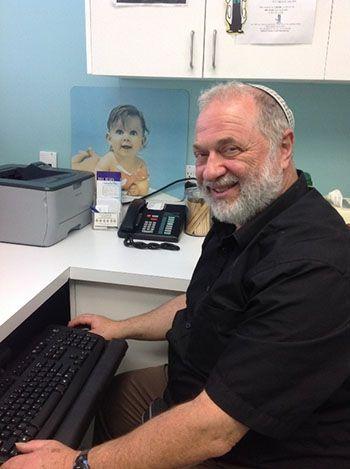

and our next step will be to plant a fruit tree. I never thought of myself as being the agricultural type, but the feeling of settling and planting a portion of Eretz Yisrael, has been truly euphoric. Iy”H, when we plant our tree, and eat the fruits that will grow one day, I think we will be able to truly appreciate that unique Kedusha found in
To conclude, when you buy your Tu B'shvat fruit this year, don’t search for those dried apricots and banana chips imported from Turkey. Rather, head over to the fresh produce and buy yourself some nice juicy Kedusha-filled Jaffa oranges and thank in , imbibing that Kedusha in every bite that


NEAR BAKA – Large luxurious 4 room apartment, Shabbat elevator, Sukkah porch, 6.200.000nis
MENDEL 052-8980111
In the heart of calm and pastoral BAKAPrivate arab house, 6 rooms, 500m + possibility of building 250m, huge garden, approx. 700m, completely renovated, underfloor heating + a/c, large parking, 5 bathrooms, 5 toilets, green
MENDEL 0528980111
TALBIYA - For rent, beautiful & bright apartment, 70m with Sukka balcony & Shabbat elevator, large living room, fitted kitchen, bathroom with bathtub & restroom, free parking for the residents, 7900nis
YAELLE 058-7792141
BAKA - 4 rooms, 6,500nis
MEKOR HAIM - 4 rooms 7,900nis
BAKA - New penthouse, 4 rooms in a small luxurious building with character, alone upstairs, 3rd floor + elevator, 4 orientations, 3 toilets, 2 bathrooms, terrace / sukkah, 70m, parking, store-room
BAKA - 3 rooms 6,000nis
5450000 NIS MENDEL 052-8980111
MICHAEL 052-3202488
MOSHAVA / In a building after TAMA 38, new apartment, 4 rooms, 3rd floor + elevator, balcony/partial sukah, opened sight, 2 bathrooms, calm, parking
HAMOSHAVA GERMANIT - Large beautiful house, 7 rooms, 300m, on 3 levels with elevator, private garden, 175m, beautiful roof terrace, 100m, quiet location, pastoral & green, 2 parking spots, 2 large storage rooms, basement, building rights
MENDEL 052-8980111
MICHAEL 052-3202488
BAKA / MEKOR HAIM - 4 rooms, 90m, 2nd floor + elevator, completely renovated, fireplace, a/c, gas heating, very central, close to all amenities
MENDEL 052-8980111
Near Arnona Hatzaira, in a step building, very

The theme of the parsha is sacrifices. Different offerings will be required in a variety of circumstances later in the book of Vayikra. This parsha outlines the rules of those offerings; not when they are brought, but how they are brought. Later we will learn about when they are required to be brought.
The parsha outlines how to do an: Olah, a fully burned offering, Shlamim, an offering consumed by the Kohanim and by the owner, the Mincha flour offerings, Chatat, a sin offering, and Asham, a guilt offering.
1ST ALIYA (VAYIKRA 1:1-13)
And He called to Moshe, and G-d spoke to him. When a person brings an Olah, it may be brought from cattle or sheep. If from cattle, the procedure is: the owner places his hands on the animal, it is slaughtered before G-d, the blood is sprinkled about the altar, the fats are burned and the entire offering is burned. If either sheep or goat, the same is done: slaughter same place, sprinkle blood, offer fats, and completely burned.
The first words of the parsha baffle the commentaries. No English teacher would allow a student to start a book “And He called to Moshe.” Who is the He? Nothing has happened in the book yet that we can refer the He to. Why begin with “And He called”?
Clearly, the Torah is deliberately referring back to the previous story. And continuing it. At the end of Shmot the Mishkan was
completed. The thick cloud descended, indicating G-d’s presence. Moshe could not enter the area of the Mishkan due to the cloud. G-d now beckons Moshe to enter, to teach the laws of offerings.
This interaction frames the book of Vayikra. In Shmot, G-d descended to us. He commanded the Mishkan, as a place to meet with us. He descended and filled the place. He approached us. And now? Our turn. Now we approach Him. In Shmot we built Mishkan, a meeting place for G-d to meet us. Now, in Vayikra, the Jewish people approach Him. The offerings are the way to approach Him. This book then is a seamless continuation of the last; there He approached us, here we approach Him.
2ND ALIYA (1:14-2:5)
If the Olah is from birds, the procedure is similar: blood sprinkled, organs burned, and completely burned. If a nefesh shall bring a flour offering, the procedure is: the flour is mixed with oil and frankincense. The Kohen takes a finger full, burns it on the altar. The remainder is eaten by the Kohanim. The flour offering may also be baked or fried as a thin matza with oil.
The Olah offering is a sliding scale. Cattle, sheep, goat, birds, flour. While the heart may stir one to approach G-d, the pocket may demur. Rashi points out that when describing the one who is bringing a flour offering, the least expensive one, the Torah uses the word nefesh, as if to say it is the soul that is bringing this inexpensive flour offering. For
some, the flour offering is as big a sacrifice as the bull is to another.
3RD ALIYA (2:6-16)
Or one may bring a fried soft flour offering. In each of these, the Kohen brings the mincha offering to the altar, offering a finger full. The remainder is eaten by the Kohanim, treated as holy of holies. No offering of this sort may be chametz or with honey. Only the first fruits offering contain chametz and honey. The Omer offering is from new barley of parched ground kernels with oil and frankincense.
How can we find meaning in sacrifices?
Let me offer the following.
In life, we experience a plethora of feelings and emotions. Success brings satisfaction; failure, disappointment. At times, we feel desperate, beaten down by challenges and uncertainty. Threats of war or of illness make us feel anxious, worried. Sin can engender a deep sense of worthlessness. At other times we feel exuberant, blessed, fortunate. That the sun has shone upon us. Gratitude, appreciation; hearts full.
Life is full of experiences of anxiety, of triumph and of disappointment. A sensitive soul needs to express itself; the religious soul needs to frame these emotions in relationship to G-d.
There are occasions outlined later in this book where offerings are required. And there are occasions when we offer these voluntarily.
An Olah is an offering that is completely burned. It expresses a complete submission to G-d. It is brought in a variety of contexts: communal offerings, individual obligatory offerings, voluntary. But whatever the context, it conveys resignation or submission. This is indeed a core attitude we have in our relationship with G-d. It can be paired
with joy, with guilt, with appreciation – but resignation and submission form the root of our religious experience. When an Olah offering is brought it can be an expression of profound appreciation, but conveying that appreciation with resignation: that it is not my hands that have wrought my success, but that I as a Jew am charged with living hand in hand with G-d. My success demands an expression to G-d, as does my desperation. I give my life wholly to Him – both my success and my despair. This complete resignation is expressed in the Olah – an offering completely burned. As if to say, I am in Your hands.
The Shlamim offering may be brought from cattle. The owner places his hands on the head, the Kohanim take the blood after slaughter and sprinkle it on the altar, and the fats are burned. If it is brought from sheep, the same procedure is followed. Or if brought from goats. An eternal law is that no blood or fats may be eaten.
The Shlamim is eaten by the owner along with the Kohen; not totally burned as is the Olah. As such, it expresses a partnership between man and G-d. It has a mood of celebration. Perhaps the joy that at a certain level, while submissive to G-d we also partner with Him. There is complexity in human experience, combining both submission and partnership.
Buy a gorgeous single family home with beautiful landscaped yard! Carmei Gat's expert Anglo agent - 4-6 bedrooms, kosher kitchen, next to Anglo Shul
Email: debisraelhomes@gmail.com
Whatsapp: 053285234
5TH ALIYA (4:1-26)
When a nefesh sins : if the Kohen sins in his official capacity, he brings a Sin offering of a bull. The Kohen places his hands on the head, the Kohen sprinkles the blood toward the curtain of the Holy of Holies and on the incense altar. The fats are burned. The bull is burned outside of the holy area, where other ashes are deposited. If the entire people err in committing a sin, a bull is brought as a sin offering. The elders rest their hands on the head of the animal, the Kohanim sprinkle the blood in front of the Holy of Holies and on the incense altar. Its fats are burned and the bull is burned outside of the holy area as was the Kohen’s sin offering. When the Ruler inadvertently commits a sin, he brings a goat. He places his hands on its head, the Kohanim place the blood on the altar corners and its fats are burned.
This aliya describes 3 sin offerings brought by leaders: the Kohen, the Sanhedrin when it makes a ruling that all the people follow and that they realize was in error, and the King. True leaders must recognize that though they hold higher office than the rest of the people, they remain subservient to G-d. Papal infallibility is not a Jewish notion; here we assume that the Kohen (the religious leader), the Sanhedrin, (the judiciary) and the King, the executive will all sin. And admit their sins.
6TH ALIYA (4:27-5:10)
If a person sins inadvertently, he brings a goat as a sin offering. He places his hands on the head, the blood is placed on the corners of the altar, the fats are burned. He may bring a sheep; the procedure is similar. If one withholds testimony resulting in an unnecessary oath, unknowingly violates
the laws after becoming impure, or takes any oath unnecessarily, a confession is made and an offering brought. The offering may be brought from sheep or goats. If the owner cannot afford these, then he may bring 2 birds, one an olah and one a sin offering.
It is crucial to note that the sin offering is not the first sacrifice in the descriptions of offerings. It is the 4th, following the Olah, Shlamim and Mincha. Sacrifices are not brought only to atone for sins. And not all sins can be expiated through sacrifices. Some do not rise to the need for a sacrifice. And for some, a sacrifice does not suffice for atonement. The offerings rather span the gamut of human experience and more accurately express a desire to engage G-d in all sorts of experiences, not just when needing atonement.
7TH ALIYA (5:11-25)
And if he cannot afford these, then he may bring a flour offering, though without oil or frankincense, as this is a sin offering. A finger’s full is brought on the altar; the Kohanim consume the rest. If a person uses sanctified property, he needs to bring a ram to atone as an Asham. And to compensate the holy fund with a 1/5 additional penalty. If a person is unsure of a sin, he needs to bring a ram to atone as an Asham. If a person denies a financial obligation and swears falsely, he must make restitution with an additional 1/5 and to bring a ram to atone.
These offerings are required to be brought to the Mishkan and later, to the Temple in Jerusalem. The experience of the grandeur of those places would generate humility. Healthy humility, knowing our place as both majestic beings and meek in His presence is generated by the experience of sacrifice in the holy place.
Remember what Amalek did to you when you left Egypt, attacking the weak when you were tired. When you settle in the Land, eliminate the remnant of Amalek.
There is a mitzvah to hear the reading of Zachor once a year. This is not the narrative of Amalek’s attack. That occurred in Sefer Shemot, right after the crossing of the sea. This reading is from Devarim, on the cusp of entering the Land of Israel.
Here the Torah ascribes Amalek’s willingness to attack due to its lack of fear of G-d. There is some historic irony and historic truth here. Attacks on the Jewish people can be by those lacking fear of G-d. And attacks on us can be by those acting in the name of G-d. G-dless have attacked; Nazis and communists. And holy crusaders have attacked us; Christians and modern fanatical Islam.
This week’s special haftorah highlights the theme of Hashem’s command to destroy the people of Amalek. This echoes the subject matter found in the Torah reading of Amalek’s unprovoked attack on the Israelites as the Isralites traveled in the wilderness and our eternal responsibility to avenge this horrendous crime.
Shmuel addresses King Shaul and commands him to wage battle against Amalek, and leave no survivors - neither humans nor beasts. The army of Bnei Yisrael kills the entire population with the exception of the king, Agag, and they also spare the best
of the cattle and sheep.
Hashem then conveys the following message to Shmuel: “I regret that I have made Shaul king.” Hashem says, “For he has turned his back from following Me, and has not fulfilled My words.”
Shaul admits that he had transgressed and then invites the prophet to join him in his return home. Shmuel refuses his offer. “Hashem has torn the kingdom of Israel from you, today; and has given it to your fellow who is better than you.” Shmuel then kills the Agag.
24th of 54 sedras; 1st of 10 in Vayikra. Written on 215 lines in a Torah, ranks 19. 21 Parshiot: 13 open, 8 closed.
111 pesukim - ranks 26 (2nd in Vayikra). Same number of pesukim as Eikev. 1673 words - ranks 20 (1st in Vayikra). 6222 letters - ranks 20 (1st in Vayikra). The sedra is of average length, but its pesukim are longer than average for the Torah.
MITZVOT
16 mitzvot: 11 positive, 5 prohibitions. The book of Vayikra has the largest number of mitzvot among the five Chumashim - 247, 40% of Taryag. On the other hand, Vayikra is the shortest Book by far - in number of columns and lines in a Sefer Torah, number of pesukim, words, and letters. This makes the mitzvah stats even more impressive.

“There is no such thing as privacy anymore.”
“There are no secrets anymore.”
These are two complaints that are heard frequently nowadays.
We live in a world of cell phones and e-mails, blogs, Facebook and Twitter. We have no privacy, for almost anyone can reach us wherever we are, whatever we happen to be doing, at all times of the day.
And we can have no secrets, because anyone who knows anything about us can spread it to the entire world in a matter of seconds.
How often have I sat down for a moment of private time, for study or contemplation, or just to “chill out”, only to have the silence disrupted by some total stranger who managed to obtain my cell phone number?
How many dozens of e-mails and blogs fill up the space of my inbox with communications that, at best, are of no interest to me and often are offensive and obnoxious?
Forever
Gelfand, Samber, and Saban families
We once felt entitled to privacy and courtesy, but they no longer seem achievable.
Often, we write a confidential note to a trusted friend, sharing a message that we would rather others not know, only to discover that the note is now circulating in cyberspace, accessible to literally everyone. Sometimes, it is the friend’s betrayal that has made our secret public. Often, it is simply misjudgment or carelessness on his part. But more frequently, it is an unwanted error, a mistaken pressing of “send” instead of “delete.”
We once expected confidentiality and discretion, but they too no longer seem possible.
Our contemporary society has lost what once was among its primary values. “A man’s home is his castle” once meant that decent citizens respected the “fences” around another individual’s personal space and would not casually trespass those boundaries.
The value of trusting in the discretion of another, once a cornerstone of human interaction, is now in danger of being relegated, along with other once cherished values, to the oblivion of “old-fashionedness.”
The right to privacy and the ability to assume confidentiality are universal human values. It is important to know that they are primary Jewish values as well. Sources for these values in our tradition include this week’s Torah portion, Parshat Vayikra.
This might come as a surprise to you, dear reader, because you know that this week’s
portion is the introduction to Leviticus, the biblical book which focuses upon sacrifices and Temple ritual. This week’s portion especially seems limited to the comprehensive and complex details of sacrificial offerings. Where is there even a hint of these contemporary concerns, courtesy and confidentiality?
The first two verses in the first chapter of Vayikra say it all, albeit between the lines:
“The Lord called to Moses and spoke to him from the Tent of Meeting, saying: ‘Speak to the Israelite people and say to them...’”
The rabbis of the Talmud saw in these simple and direct phrases two subtle messages.
First of all, the Lord called to Moses first and then spoke to him. He didn’t surprise Moses. He didn’t intrude on Moses’ privacy and autonomy. First, He called to him. He knocked on Moses door, as it were, ringing the bell first, asking to be invited in. No unwanted intrusion, even from the Lord Almighty, to his favorite prophet!
This observation is made by the rabbis in the Talmudic tractate of Yoma. In a less well-known Talmudic source, the tractate of Derech Eretz, the rabbis find that the Almighty’s courteous concern for the privacy of his lowly creatures did not begin with Moses. It goes back to the way He treated the very first man, Adam. Genesis chapter three, verse nine: “The Lord God called to Adam and said to him: ‘Where are you?’” Here too, even when the Lord wishes to rebuke Adam, He first “calls to him”, signaling the uncomfortable conversation which is about to ensue.
God respects Adam’s privacy, and He doesn’t just “barge in” on Moses. Surely a lesson in human values.
The rabbis on the same page in the tractate of Yoma find another message in the
RASKO CLOSE SAN SIMON
Nice 2.5 rooms, ground floor, balcony, good shape, in process of evac & rebuild, quiet, exclusive, good deal! 2,300,000 NIS
ARNONA
Great 3 rooms, 78m, in a building with Shabbat elevator, balcony, good shape, large living room, master bedroom, parking, storageroom, quiet. 2,850,000 NIS
HEART OF BAKA
Great location, lovely 3.5 rooms, 80m, 2 balconies, exit to garden, renovated, master bedroom, quiet. 3,560,000 NIS
KIRYAT SHMUEL
Large 4 rooms, 96m, Shabbat elevator, balcony with view, good shape, large living room, master bedroom, parking. 3,950,000 NIS
28, Kovshei Katamon Street, Jerusalem Tel: 02.5633008 - www.ben-zimra.com
deceptively simple opening verses of our parsha. “...saying: ‘Speak to the people and say to them...’” From the redundancy here, “say,” and “speak,” and “say,” the rabbis derive the lesson that when someone tells you something, you are forbidden to share it with another unless you are given explicit permission to do so.
Moses was not permitted to re-tell even the divine message that he heard until God Himself told him that it was okay to “say it over”.
The medieval Rabbi Moses of Coucy actually enumerates this admonition for utter confidentiality as one of the prohibitions comprising the 613 commandments of the Torah.
As I have reflected upon these specific teachings over the years of my personal parsha study, I have come away with several conclusions: Firstly, there is much that is implicit in the Torah; much that lies beneath the surface. The long and complicated ritual laws that
confront us as we read this week’s parsha are contained in a context that teaches us more than the surface lessons. Our rabbis of old were particularly expert at digging out these unexpected but precious nuggets.
Secondly, these nuggets are often of astounding relevance for our contemporary condition. What can be more relevant than a reminder about the values of courtesy and confidentiality?
Finally, these lessons are not merely abstract teachings or bits of wisdom for us to ruminate upon as we relax in our armchairs. Rather, they are calls to arms. They are challenges.
It is difficult indeed to combat the value system that is foisted upon us by the technol ogy which pervades the world in which we now live. Very difficult. But very necessary.


If we lazily submit to the pernicious influ ence of modern convenience, we risk the ultimate loss of our very humanity.
A culture devoid of courtesy can turn into a culture of callousness and cruelty.
A world where one cannot trust his confidante is a world where authentic friendship is impossible.
Troubling thoughts? Yes, indeed. But they are thoughts which we ignore at our own peril.
How fortunate are we that these thoughts are available to us, subtly embedded in the opening verses of this week’s Torah portion!




*Duplex! 5 bdrms, 25 sqm kitchen, succah, shabbat elevator, 2 parking, storage.
*New 228 sqm duplex penthouse, 30 sqm succah, shabbat elevator, parking, view
TALBIEH
250 sqm + 200 sqm garden, private land
NACHLAOT
2 rms, priv entr, storage room, NIS 2,190,000
OLD KATAMON
*Renovated 3 bdrm, ensuite MB, succah, low floor *160 sqm 4 bdrms, garden, storage, parking
HAR NOF -New listing!
Centrally Located– 10 room duplex with 400 sqm garden (room for a pool), excellent condition
MEKOR CHAIM - NEW PROJECT
126 sqm, spacious 4 bdrms, succah, 3 exposures, 2 parking, storage. Close to Baka & G. Colony SALE/RENTAL - RAMOT B
Cottage, 200 sqm, 5 bedroom, 3.5 bathrooms, semi furnished, garden, view. Option for a unit

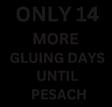



May the learning of these Divrei Torah be תמשנ יוליעל HaRav Ya'akov Zvi ben David Arieh zt"l
תומשנ יוליעל
ה״ע רטרש קחצי תב הינעמו בייל הירא ןב לאירזעו ה״ע זייא דוד לארשי תב הדלוגו רשא בקעי ןב
Our parsha, which deals with a variety of sacrifices, devotes an extended section to the chattat, the sin offering, as brought by different individuals: first the High Priest (Ex. 4:3-12), then the community as a whole (Ex. 4:13-21), then a leader (Ex. 4:22-26) and finally an ordinary individual (Ex. 4:27-35).
The whole passage sounds strange to modern ears, not only because sacrifices have not been offered for almost two millennia since the destruction of the Second Temple, but also because it is hard for us to understand the very concepts of sin and atonement as they are dealt with in the Torah.
The puzzle is that the sins for which an offering had to be brought were those committed inadvertently, be-shogeg. Either the sinner had forgotten the law, or some relevant fact. To give a contemporary example: suppose the phone rings on Shabbat and you answer it. You would only be liable for a sin offering if either you forgot the law that you

may not answer a phone on Shabbat, or you forgot the fact that the day was Shabbat. If, for a moment, you thought it was Friday or Sunday. So your sin was inadvertent.
This is the kind of act that we don’t tend to see as a sin at all. It was a mistake. You forgot. You did not mean to do anything wrong. And when you realise that inadvertently you have broken Shabbat, you are more likely to feel regret than remorse. You feel sorry but not guilty.
We think of a sin as something we did intentionally, yielding to temptation perhaps, or in a moment of rebellion. That is what Jewish law calls be-zadon in biblical Hebrew or be-mezid in rabbinic Hebrew. That is the kind of act we would have thought calls for a sin offering. But actually, such an act cannot be atoned for by an offering at all. So how are we to make sense of the sin offering?
The answer is that there are three dimensions of wrongdoing between us and God. The first is guilt and shame. When we sin deliberately and intentionally, we know inwardly that we have done wrong. Our conscience – the voice of God within the human heart – tells us that we have done wrong. That is what happened to Adam and Eve in the
Garden of Eden after they had sinned. They felt shame. They tried to hide. For that kind of deliberate, conscious, intentional sin, the only adequate moral response is teshuvah, repentance. This involves (a) remorse, charatah, (b) confession, vidui, and (c) kabbalat he-atid, a resolution never to commit the sin again. The result is selichah umechilah, God forgives us. A mere sacrifice is not enough.
However, there is a second dimension. Regardless of guilt and responsibility, if we commit a sin we have objectively transgressed a boundary. The word chet means to miss the mark, to stray, to deviate from the proper path. We have committed an act that somehow disturbs the moral balance of the world. To take another secular example, imagine that your car has a faulty speedometer. You are caught driving at 50 miles per hour in a 30 mile an hour zone. You tell the policeman who stops you that you didn’t know. Your speedometer was only showing 30 miles per hour. He may sympathise, but you have still broken the law. You have transgressed the speed limit, albeit unknowingly, and you will have to pay the penalty.
That is what a sin offering is. According to Rabbi Shimshon Raphael Hirsch it is a penalty for carelessness. According to the Sefer Ha-Chinuch it is an educational and preventive measure. Deeds, in Judaism, are the way we train the mind. The fact that you have had to pay the price by bringing a sacrifice will make you take greater care in future.
Rabbi Isaac Arama (who lived in Spain in the 15th century) says that the difference between an intentional and an unintentional sin is that in the former case, both the body and the soul were at fault. In the case of an unintentional sin only the body was at fault,


Jerusalem Real Estate is My Business
Eta: 054-723-3863
Amazing stand alone homes in OLD KATAMON,
TALBIYA, BAKA, GERMAN COLONYIn OLD KATAMON 220 sqm plus 80 sqm of outdoor space. For renovation, pkg & storage. Includes separate unit. 9,000,000 NIS
In GERMAN COLONY. 300 sqm plus 170 sqm registered garden. Plus parking and roof top terrace. Price: 18,000,000
OLD KATAMON Spacious 253 sqm apartment
FOR RENT. 7 bedrooms, 4.5 bathrooms, large outdoor space , private entrance, parking. 32K/mo
In BAKA, 236 sqm on two floors, plus 80 sqm of outdoor space, high ceilings, authentic Jerusalem bldg with modern addition. 4 bedrooms, office/ or sitting room. Master suite on entrance level. Parking & storage. Price: 15,950,0000
BAKA Two story penthouse
200 sqm. Light open space kitchen & living room, sukkah terrace. Elevator, balconies, 2 parking, elevator, storage room. 12,500,000 NIS
GERMAN COLONY/TALBIYA
400 sqm on one floor, parking, storage, large sukka terrace






Eta Morris Realty, Ltd.
etamorrisrealestate@gmail.com
Eta: 054-723-3863 etamorrisrealty.co.il
not the soul. Therefore a physical sacrifice helps, since it was only the physical act of the body that was in the wrong. A physical sacrifice cannot atone for a deliberate sin, because it cannot rectify a wrong in the soul.
What the sacrifice achieves is kapparah, not forgiveness as such but a “covering over” or obliteration of the sin. Noah was told to “cover” (ve-chapharta) the surface of the Ark with pitch (Gen. 6:14). The cover of the Ark in the Tabernacle was called kapporet (Ex. 25:17). Once a sin has been symbolically covered over, it is forgiven, but as the Malbim points out, in such cases the verb for forgiveness, s-l-ch, is always in the passive (venislach: Lev. 4:20, Lev. 4:26, Lev. 4:31). The forgiveness is not direct, as it is in the case of repentance, but indirect, a consequence of the sacrifice.
The third dimension of sin is that it defiles. It leaves a stain on your character. Isaiah,

in the presence of God, feels that he has “unclean lips” (Is. 6:5). King David says to God, “Wash me thoroughly from my iniquity, and cleanse me from my sin” – “me-chatati tahareni” (Ps. 51:4).
About Yom Kippur the Torah says:
“On that day atonement will be made for you, to cleanse you [letaher etchem]. Then, before the Lord, you will be clean from all your sins.” (Lev. 16:30)
Ramban says that this is the logic of the sin offering. All sins, even those committed inadvertently, have consequences. They each “leave a stain on the soul and constitute a blemish on it, and the soul is only fit to meet its Maker when it has been cleansed from all sin” (Ramban to Lev. 4:2).
The result of the sin offering is tehora, cleansing, purification. So the sin offering is not about guilt but about other dimensions of transgression. It is one of the stranger features of Western civilisation, due in part to Pauline Christianity, and partly to the influence of the philosopher Immanuel Kant, that we tend to think about morality and spirituality as matters almost exclusively to do with the mind and its motives. But our acts leave traces in the world. And even unintentional sins can leave us feeling defiled.
The law of the sin offering reminds us that we can do harm unintentionally, and this can have psychological consequences. The best way of putting things right is to make a sacrifice: to do something that costs us something.
In ancient times, that took the form of a sacrifice offered on the altar at the Temple. Nowadays the best way of doing so is to give money to charity (tzedakah) or perform an act of kindness to others (chessed). The Prophet said so long ago, in God’s name:
“For I desire loving-kindness, not sacrifice.”
Hosea 6:6
Charity and kindness are our substitutes for sacrifice and, like the sin offering of old, they help mend what is broken in the world and in our soul.
These weekly teachings from Rabbi Sacks zt”l are part of his ‘Covenant & Conversation’ series on the weekly Torah teaching. With thanks to the Schimmel Family for their generous sponsorship, dedicated in loving memory of Harry (Chaim) Schimmel. Visit www.RabbiSacks.org for more.


Former




“…..Timcheh et zeicher Amalek mitachat hashamayim”
The special Maftir reading for Shabbat Zachor, the Shabbat before Purim, obligates Israel to destroy the nation of Amalek. The source of this mitzvah is first found in the final p’sukim of parashat B’shalach where, after relating Amalek’s perfidious attack of on the weakest stragglers in the rear of the Israelite camp, Hashem promises Moshe (in the almost exact words of the yet-to-be-commanded mitzvah): “….ki machoh emcheh et zeicher Amalek mitachat hashamayim”. The twice-mentioned requirement to obliterate the very memory of Amalek has troubled many over the years, those who see this obligation as one that seemingly conflicts with the moral ethic laid out in our divinely given Torah.
The discomfort many felt (and still feel) has become far more pronounced over the past century, ostensibly the result of the growing sensitivity to the innocent and less-fortunate. The very idea of destroying those not involved in the “original sin” of the unprovoked attack is seen as an anathema to the entire ethical approach fostered by our tradition!
And that discomfort is fully understandable….if we do not understand the mitzvah.
Consider: Our texts are filled with nations, countries and empires that have oppressed us, persecuted us and even killed us – yet, G-d never commanded us not to forget their
evil to not allow them exist! Yet that is what he charged us to do against Amalek! Why was his actions considered unique so as to be destroyed???
The purpose of the commandment is NOT to visit REVENGE against a nation or its population. If that were so, we could rightfully argue that the punishment did not “fit the crime”, indeed, such a mandate would have us destroying a nation that no longer exists, punishing individuals who do no evil and, heaven forfend, even be guilty of a “disproportionate” reaction to a single attack.
No. Hashem had no “need” for us to take REVENGE – for, in truth, only He knows what proper retribution is – “Kel n’kamot Hashem!”! Nor did He “need” His people to destroy an entire nation, something He Himself could have done. But He DID expect a moral force in His world to fight against - and to REMOVE - the source of pure evil that would prevent the establishment of a moral world! And that struggle to perfect the world and prepare it for G-d’s revelation (“l’taken olam b;malchut Shakai”) depends upon the removal of the thoroughly malevolent IDEAS, destructive PHILOSOPHIES and corruptive VALUES that undermine humanity. It demands the courage to reject such cultures that sanctify murder, glorify rape and purify pillage – even when many find reason to support them.
Therefore, we must proclaim that we do
be in loving memory and
our dear parents whose yahrtzeits are in Kislev
been memorialized in a popular song, "An eternal people does not fear the long and arduous path."
Doris Weinberger a"h
not fight for revenge, but rather, we struggle for morality, for ethics and for the sanctity of life! Sadly, Hashem knew that this struggle would continue into the future, “midor dor” from generation to generation, knowing fullwell that the depravity of “Amalekism”, the wantonness of attacking the innocent and defenseless, would poison future cultures… and spread around the world.
ולסכ 'ד -ה"ע המלש לאקזחי תב האל הרובד
Max Weinberger z”l
ולסכ ז"כ -ל"ז בד ןב ךלמילא
Patience is necessary for those who follow Isaac's way. But a wise woman taught us that patience is but another name for hope. That woman was Jane Austen, who put these words into the mouth of one of the characters in her great novel, Sense and Sensibility: "Know your own happiness. You want nothing but patience—or give it a more fascinating name: call it hope."
Greatly missed by their children, grandchildren and great grandchildren
Rav Aryeh and Dvora Weinberger
Bernie and Leah Weinberger
Menachem and Hannah Katten
Haman learned it, and spread that hatred throughout Persia, the Romans followed in the same path, the medieval Church fathers knew it and taught it to their followers and so did the Inquisitors, the Chmelnikis, Czars and, of course, the nazis, y”sh. ….And it is the struggle we wage today.
In observance of the Shloshim of our friend Yehuda Leib Berren z"l
Rav Menachem Weinberg will give a shiur in his memory "Heroic Joy"
Monday evening, 23 November/ 8 Kislev 7:30pm
And that is why Hashem charged us: “Zachor”! “Never Forget!”
Zoom Meeting: 853 8980 1519
Password: Yehuda
Our very existence depends on remembering that.


shmuelnathan4@gmail.com

ANGLO-
ISRAEL’S LEADING REAL ESTATE NETWORK
COUNTRY LIVING IN CLASSICAL JERUSALEM!
On the top of prestigious Abu-Tor, rare small semi-detached house on a beautiful 365 Sq.m. plot, great potential & building rights, private land, ideal central & quiet location. Exclusive! Moshe 053-6305725
RASSCO (TCHERNICHOVSKY)
Last 4 + 5-rm apts & penthouses in New Boutique Building Top floors (5-7), huge Sukkah terraces, Shabbat elevator, view, elegantly designed, quality finishings, 3 exposures, quiet, central location. Exclusive! Ilana 053-4872526
BAKA - MORDECHAI HAYEHUDI ST.
Beautiful 5.5-room garden apartment in the heart of Baka, Arab-style house, next to Derech Beit Lechem shops & restaurants, private entrance, 152 sq meters, stunning large garden, lots of light. Exclusive! Nava 053-6642512
3 Moshe Hess St., Jerusalem 0778038511
 Rav Kehilla, Nofei HaShemesh Maggid Shiur, Daf Yomi, OU.org Senior Ra"M, Kerem B'Yavneh
Rav Kehilla, Nofei HaShemesh Maggid Shiur, Daf Yomi, OU.org Senior Ra"M, Kerem B'Yavneh
Parshat Vayikra introduces us to the world of Korbanot (sacrifices). One of the korbanot that is offered is a תאטח ןברק (Chatat), that is brought by an individual who violates a command גגושב - inadvertently. If the individual did not purposely commit a sin, why are they obligated to bring any sacrifice? If the transgression was accidental – what הרפכ – what type of forgiveness is required?
The Torah tells us that when one commits a sin גגושב:
"ה תֹוצמ לכמ תחא התשעו אטחת יכ שפנ םאו יכ...ֹונֹוע אשנו םׁש או עדי אֹ לו הנישעת אֹ ל רׁש א
)טי-זי :ה ארקיו( ”הל םשא םשא
In Michtav M’Eliyahu, Rav Dessler offers a fascinating insight into the concept of a transgression b’shogeg. A person does not forget to eat. When something is important to an individual, they internalize it and it becomes second nature. If one violates a command, apparently
Love from all your children, grandchildren and great grandchildren
its significance was not internalized in that individual. The word םשא perhaps reminds us of the word םש – there. The transgressor acted without fully being there. He or she may have been physically present, but if they consciously contemplate their actions, they would not have violated any prohibition. They acted because the mitzvah was external – its significance not adequately internalized.
There is an idea expressed by the Kotzker Rav, that extends this idea to our daily lives. At the end of Parshat Mishpatim it is stated:
םש היהו הרהה ילא הלע השמ לא "ה רמאיו רשא הוצמהו הרותהו ןבאה תחל תא ךל הנתאו
)בי:דכ תומש( .םתרוהל יתבתכ
And Hashem said to Moshe, “Ascend to Me on the mountain and remain there, and I will give you the stone tablets, the law and the commandments, which I have written to instruct them.” (Shemot 24:12)
Hashem commanded Moshe to ascend the mountain and receive the luchot. Why did Hashem first request that Moshe “ascend the mountain” and then demand heyeh sham –“be there.” Isn’t that redundant? Obviously if Moshe went up the mountain, he’d be there. Where else would he be?
The Kotzker Rebbe, Rav Mendel MiKotz, sharply answers that often we can “ascend a
mountain,” but not really be there. For example, we might attend a shiur and be physically present, but not truly there. We may be at a wedding or other simcha, but we feel somewhat spaced out. We may be physically located somewhere but our mind is elsewhere. The Kotzker Rebbe teaches: Don’t just go up the mountain. Rather, experience the situation you’re in, whatever it is. BE THERE!
Our generation suffers from multitasking overload. We are often involved in so many activities that we aren’t focusing on any of them. The Torah is teaching us an important lesson. Don’t go somewhere physically but leave your head or heart out of it. One needs to internalize and be fully cognizant of their actions and surroundings at all times. In that way we will avoid inadvertent transgressions and make the most of every experience.


The themes and lessons that are woven throughout the Purim story, celebration and mitzvot are numerous. The Talmud (Megilah 11a) records how several different Amoraim would introduce a discourse on the Megilah by relating a particular verse that he felt encapsulated the Purim story. Rav Massna maintained that the following verse epitomizes the overall Purim motif.
“Ki mi goy gadol asher lo Elokim kerovim eilav ke’Hashem Elokeinu bechol koreinu eilav - For what great nation is there that has God so near to it, as Hashem our God is at all times that we call upon Him?” (Devarim 4:7) Rambam echoes this idea as one of the main purposes of reading the Megillah. Let us explore where we find this theme manifested in the Megillah and in our avodah of the day.
Keri’at Megillah, reading the Megillah, is the only mitzvah of Purim that is performed both on Purim night and during the day as well. The source for this is King David’s cry, “Elokai ekra yomam ve’lo ta’aneh ve’layla ve’lo dumiya li – Oh my G-d! I call out by day and You do not answer; and by night, but there is no respite for me.” (Tehillim 22:3) The reading at night has the quality of tefillah, while the day reading expresses praise to Hashem, hallel, for our salvation. We are reminded
of our people’s prayers, both during the night and the day as well, at the time of the Purim miracle. Indeed, Purim usually follows Ta’anit Esther, a day that is characterized by tefillah and teshuvah. The fast day recalls how the Jews fasted, prayed, and did teshuvah as a means to prepare themselves for battle on the 13th of Adar. It is an auspicious time for us to daven as well, evoking the merit of Mordechai and Esther, to recite chapter 22 of Tehillim and then ask Hashem for our personal requests. Ta’anit Esther prepares us for the megillah reading at night, as our mindset becomes one of “fasting and crying out.”
Mordechai of the Purim story is an individual who personifies tefillah. The Gemara (Megillah 12b) teaches that his ancestors’ names all express the theme of his tefillah. His father is called Yair to express how Mordechai “enlightened the Jews’ eyes with his tefillah.” His grandfather is Shim’i as a description of “one whom Hashem heard his prayer;” his great-grandfather Kish is named thus as he “banged on the doors of heaven and they opened.” Mordechai’s own name is related to “mor dror,” the incense spice, which is associated with the service of Hashem. We see that Mordechai’s immediate reaction to Achashveirosh’s decree was to rip his clothes and cry out in tefillah. Even after he is driven through the streets wearing the king’s royal garments, he returns to his sackcloth and prayer. The Chatam Sofer learns from his actions - even when the ‘tides turn’ and things look like they are changing for the
good, one should never stop davening until the full salvation has been achieved.
Most fascinating is that the middle verse of the Megillah signifies supplication and plea, “Vata’an Esther vatomar, she’eilati u’vakashati” (Esther 5:7); Esther states that she has a request and appeal. This clearly points to the core of the megillah - asking, requesting, calling out to Hashem. Further, the middle word of the entire Megillah is “she’eilati,” my request! Our focus is what we request from Hashem - indeed, she’eilah has the same numerical value as Purim!
Rav Pinucs zt”l notes that after the Megillah reading is one of the most powerful moments for tefillah, the gates of heaven are open and we can daven fervently. This is an et ratzon, a propitious time, higher than Ne’ilah on Yom Kippur. Moreover, as Achaveirosh asked Esther at their feast what she requests, at our Purim feast, the King Himself asks ‘the Esther’ - the soul inside of each of us, what we most want. It is an auspicious time to daven for our deepest longings and desires. Rav Biderman tells us that each moment on Purim has a similar power and energy to that of Kedushah during Ne’ilah on Yom Kippur.
Especially this year, as Am Yisrael has been challenged in ways beyond our comprehension, we must harness this energy and daven earnestly not only for our personal entreaties, but also for the return of our hostages, the safety of our soldiers, and the protection of the entire Jewish people.
 donated by Marion & Michael Silman Ita Rochel 02-560-9125
donated by Marion & Michael Silman Ita Rochel 02-560-9125





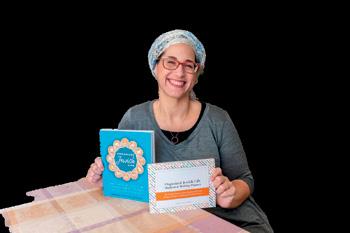

The heiligeh Rebbe Dovid of Dinov was a brilliant scholar, charismatic darshan and miracle worker. The son of Reb Zvi Elimelech, the Bnei Yisaschar, he was renowned throughout the region, revered by Jews and non-Jews alike. Rebbe Chaim of Sanz related that anyone who gazed into Reb Dovid’s eyes would be inspired for a lifetime.
Dinov was known for the holy joy of its Purim celebrations. All year, the townsfolk looked forward to the exalted atmosphere in the presence of the tzadik, whose lofty and sublime avodah on that great day deeply uplifted them. One year, at the height of seudas Purim, when those gathered had reached the highest level of ad d’lo yada, one of the leaders of the community interrupted the exuberant singing and ecstatic dancing with a desperate plea. “Holy Rebbe, chevreh! Please listen! I was just informed that there is a group that is planning a full-scale pogrom in our city, on Seder night. As we speak, they’re on the other side of town plotting their own Gezeiras Haman, to destroy us, men, women, elderly and children!”
Despite the inebriated elation, the music stopped and everyone fell into a shocked silence. All eyes were on the Rebbe. Reb Dovid stood up, lifted his wine goblet, closed his eyes and cried out with a booming voice: “Teshuasam hayisa la-netzach! Our salvation is eternal! Know, dear friends, the Throne of Hashem is not complete until Amalek is
totally erased! Whoever is ready to erase him, to complete this great fixing of evil, follow me!” The intoxicated chasidim burst into shouts of joy and danced behind the Rebbe as he strode confidently out the door. They piled onto wagons and continued the raucous farbrengen, baderech.
Reb Dovid’s carriage stopped in front of a tavern at the edge of town. All the chasidim leapt out of their wagons, geared for a showdown, and followed the Rebbe as he pushed the door open and entered the tavern. The air was thick with the smoke and dark whispers of the anti-Semites, who were also drinking. Tension filled the air as Reb Dovid, in his golden bekisheh walked right up to their menacing leader. He grabbed the hand of the brutish man and looked him in his eyes, which were now wide with terror — but then abruptly smiled and motioned to the chevreh to strike up a niggun.
Once more, the chasidim burst into singing and clapping, and the Rebbe started dancing with the bewildered head of the anti-Semites. Just as unexpectedly, everyone in the tavern began singing along and dancing, and within a few seconds, all were stomping, and raising their cups of mashkeh into the air with joy.
The Yidden joined hands with the peasants and started jumping up and down, swept into an ecstasy that grew and grew. Then, shining with kedushah, the Rebbe raised his hand and
everyone was quiet. “My dearest brothers,” he said to the gentiles, “dancing together is such a delight! Have any of us ever felt such joy, such brotherhood?! Could it possibly be that…someone here…hates us Jews?”
The leader of the anti-Semites turned red, looked down at his feet and shook his head in denial. Reb Dovid continued, “I’m sorry to break the news to you, then! We heard the strangest, most terrible rumor — I’m sure it’s not true — that some people in this part of town were planning a pogrom against us, to attack us on the Eve of Passover?!”
Filled with remorse and shame, the peasants in the tavern pleaded, “No, no, Rebbe! It wasn’t us! We would never do that!”
“So tell me then, since we are having such a sweet get-together” said Reb Dovid, “why shouldn’t we be the best of friends, forever?”
Moved to tears by the tzadik’s awesome holiness and love, they all cried, “Yes, Rebbe, yes! Please be our best friend! Forever and ever!”
Then the real dancing began….
חכׁש ת אֹ ל םימׁש ה תחתמ קלמע רכז־תא החמת
“Erase the remembrance of Amalek from under the Heavens — do not forget!”
(Devarim, 25:19)
We are a nation consumed with a desire to fix the world, a people who love life, yearn for peace and have a collective heart filled with love for Hashem’s creations. My brother, Rav Elie, has suggested that in commanding us to constantly remember Amalek’s hatred, it is as if the Ribbono shel Olam foresaw how difficult it would be for His merciful, spiritually sensitive nation to confront the painful reality that an entire society can become so cruel, evil and destructive, that it is actually
worthy of complete annihilation.
Indeed, for many of us, it is hard to face the reality that we face an un-uniformed enemy dedicated to the murder of Jews. In crowds of tens of thousands, our Jihadist neighbors throughout Eretz Yisrael — and their supporters across the globe — gleefully celebrate the heinous, bloodthirsty crimes perpetrated against us. This, then, is our mitzvah today: Zachor, “Remember — do not forget!”.
A teaching from Rav Joseph Soloveichik zy’a makes this directive exceedingly clear:
Our faith in man’s goodness should not blind us to the latent demonic in man. Civilized men can become the personification of evil. The thin veneer of social restraint can suddenly be lifted, exposing the ugly, brutish potential of man. Created “in the image of God,” man can also assume a satanic identity. He is capable of going berserk, of turning into a monster.
The edict was given in Shushan the Capital, and the king and Haman sat down to drink, and the city of Shushan was perturbed. (Esther, 3:15)
Their bewilderment was due to the traditional naivete of the Jew who cannot believe that human beings may act like predatory beasts of the jungle. This was a traumatic discovery for the Jews of Persia. The Jew believes intuitively in man’s inherent goodness, that a Divine spark inhabits every human being, even the habitual sinner and criminal. This is the basis of teshuvah, that the kernel of man’s soul remains ever uncontaminated, and may yet induce a moral regeneration. The sudden confrontation with total ‘Amalek-style’ cruelty is therefore a painful, rude awakening, whenever it happens in our times.
Amalek is obviously more than a nomadic
tribe. He is more than a particular group, nationality or people. He is Everyman gone berserk, who has shed his Divine image for that of Satan. Any nation which declares that its core mission statement is to destroy the Jewish people is an extension of Amalek, for it has emblazoned on its banner the slogan of impassioned hatred: Come, let us destroy them from (being) a nation, and the name of Israel will no longer be remembered (Tehillim, 83:5).
This is the persistent treachery against humanity that HaKadosh Baruch Hu bids us to combat and against which He has sworn eternal enmity. It is for this reason that there is a positive Torah commandment: You shall (always) remember what Amalek did to you… do not forget!
The ethical sensitivity and respect for man, which was so successfully imprinted upon the Jewish personality by the Egyptian experience and reinforced by the preaching of the Prophets, should not blind Jews to stark realities. A sober awareness of dire possibilities will hopefully lead to vigilance and to precaution. Amalek is (not just a spiritual mashal, but) a historic phenomenon; Lo tishkach – the lesson must never be forgotten.
(Adapted from Reflections of the Rav)
רֹודו רֹוד־לכב םישענו םירכזנ הלאה םימיהו ימיו ריעו ריעו הנידמו הנידמ החפׁש מו החפׁש מ ־אֹ ל םרכזו םידוהיה ךותמ ורבעי אֹ ל הלאה םירופה ׃םערזמ ףוסי
“These days are recalled and observed in every generation: by every family, every province, and every city. And these days of Purim shall never cease among the Jews, and the memory of them shall never perish among their descendants.” (Esther, 9:28)
We all yearn for the great day, when we
will pile into the kretchmer and dance, sing and celebrate the sweetening of judgments and the Oneness of the brotherhood of all mankind. Until then, may we fulfill the mitzvah of defending ourselves, and wiping out our enemies. May we take pride and rejoice in the the decimation of Amalek in all of its manifestations, וטושפכ, in the simple, literal meaning of those words. And as in the days of Shushan, may we be blessed to experience and witness with our own eyes, the sweetness of vengeance and fulfillment of the words of the Megillah:
ןדבאו גרהו ברח־תכמ םהיביא־לכב םידוהיה וכיו :םנוצרכ םהיאנ�שב ו�שעיו
“The Jews struck all their enemies with the sword, slaying and destroying; they wreaked their will upon their enemies.” (Ibid, 9:5)
Then… the real dancing can begin.







Diplomate of Oral Implantology
Faster, Easier and Better than ever before.
Come and get a second opinion, if you were told you need:
Bone grafts or sinus lifts
Cutting and stitching
Months without teeth
Not enough bone (These can usually be avoided today)
Almost always with less pain and less swelling, thanks to Lasers and Advanced Technologies. No-cost consult. No-cost x-rays (2D/3D) if have already, within last 6 months.


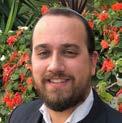 BY RABBI EZRA FRIEDMAN Director, The Gustave & Carol Jacobs Center for Kashrut Education
BY RABBI EZRA FRIEDMAN Director, The Gustave & Carol Jacobs Center for Kashrut Education
The prohibition
As mentioned in previous articles, our Sages decreed that kosher food cooked by a non-Jew is prohibited for consumption. The decree, bishul akum does not apply to all non-Jews; one of the earliest disputes is regarding servants or employees. This issue has significant implications for restaurants, hospitals, and foreign home-care workers.
According to Biblical law, food that is completely kosher and cooked by a nonJew is permitted. However, our Sages decreed that such food, even when cooked in kosher utensils, is prohibited for consumption. This prohibition is known as bishul akum. In the coming weeks we will discuss the parameters of this rabbinic prohibition, including the reasons behind the decree, when it applies, and the practical halacha for modern industrial kashrut.
Ramban is quoted in various places as allowing a non-Jewish servant to cook for a Jew. Orchot Chaim (Isurei Maachlot 16) explains that the leniency is based on a purely halachic consideration. A slave belonging to a Jew, has certain halachic obligations such as keeping Shabbat and having a brit milah, and is considered “half Jewish”, meaning he is not a halachic Jew yet has a status in between Jewish and non-Jewish. The subject of halachic servants, avadim in Hebrew, is discussed in Shulchan Aruch YD 267. According to Ramban the decree of bishul akum only applies to those who are completely non-Jewish, not to those with the halachic status of avadim.
Food is a very connecting element in every society. That is the basis behind the decree of bishul akum. Our Sages were very concerned about close relationships with non-Jews since intermarriage is a very severe transgression. The prohibition effectively limits Jews and gentiles dining with each other, although there is no specific prohibition against dining with a non-Jew per se. (See Rashi on Avodah Zara 31:b.)
Forbidding the non-Jew’s cooking would be enough to create an emotional distance such that families wouldn’t marry into each other.
Rabbeinu Tam (Tosfot Avodah Zara 38:a) and Rambam (Ma’achalot Asurot 17:9)
Re’ah (Bedek Habayit 3:7), his student, quotes a different ruling by the Ramban. Re’ah claims that our Sages only enacted bishul akum in a
case where the cooking is done in a non-coercive or professional relationship, since only then is there a concern of mingling and potential intermarriage. However, the decree was never meant for a setting where the non-Jew is a servant or employee. Although the Re’ah offers this insight in the name of Ramban, he mentions that Ramban himself felt this reason was not strong enough to set aside the decree, since halacha generally does not differentiate between scenarios for rabbinic decrees.
maintain that the decree is based on this issue of closeness to non-Jews that could lead to intermarriage; this is the opinion of most early authorities. However, Rashi and others attribute a different reasoning to the prohibition of bishul akum, which is that non-Jews might mix non-kosher ingredients into the kosher food. In future articles we will discuss whether the parameters of bishul akum are based on both of these reasons or just one. However, it is clear from numerous sources that the danger of intermarriage is the main reason behind the prohibition (See Torat Habayit 3:7).
Rashba in his responsa (1:149) does not accept any differentiation between non-Jews, whether they are servants or not. Re’ah (ibid) rules that since there is truth in both opinions, it is appropriate to be stringent.
The decree is binding regardless of the reason
Since the transgression of intermarriage was the primary concern behind our Sages’ decree, their goal was to powerfully discourage the possibility of developing emotional connections to non-Jews that could lead to intermarriage either in that generation or the next. Accordingly, early authorities discuss whether the prohibition of bishul akum still applies even in situations where intermarriage is not technically possible. For example, Rashba, in his responsa (1:248), examines the case of food cooked by a priest. Being that Catholic priests do not marry nor do they have children with whom to intermarry, is it permitted to eat food cooked by a priest even though the reason for bishul akum seemingly does not apply to
Shulchan Aruch (YD 113:4) cites both opinions, and later authorities rule that he gives greater weight to the stricter opinion (Aruch Hashulchan YD 113:4). In addition to this ruling, Ta’z (YD 113:3) and others note that the reality of an actual halachic slave had long been abolished (even during the times of the Ta’z over 400 years ago). The Ta’z explains that the only basis to be lenient regarding non-Jewish servants or maids was because they had the status of “half Jews”; they were literally the property of their masters and had almost no freedom. In his time, however, and certainly in modern times, butlers and maids are considered workers who are employed for a period of time and with contracts that can be broken. In such a reality, there is no basis
Call
077-2050015
052-2678749
RASCO

master suite, elevator, balcony, very nice view 2,950,000 NIS
for leniency (see Pri Chadash 113:9).
ARNONA: 4-room apartment, 90m, beautifully renovated, master suite, balcony, storage, Shabbat elevator, private parking 3,250,000 NIS
In the following articles we will expand more on the subject of non-Jewish butlers, maids and household help.
BAKA: New 4 room apartment in a new building, 88m, master suite, storage, Shabbat elevator, private parking, 3,950,000 NIS
RECHAVIA: 4-room apartment, 92m, Suka balcony, Shabbat elevator, fully accessible, private parking, storage 4,400,000 NIS
ARNONA: 5-room apartment, 120m, balcony, elevator, fully accessible, private parking, storage 4,350,000 NIS
BAKA: 5-room garden apartment, 140m, master suite, private parking, storage, full of light, airy, nice garden, 5,000,000 NIS
OLD KATAMON: Spacious new 5-room penthouse, 155m, terrace, great panoramic view, underfloor heating, Shabat elevator, 2 parking, + rental unit, 8,900,000 NIS
FOR RENT: BAKA: nice 4-room apartment, 82m, beautifully renovated, master suite, air conditioners, balcony, 2nd floor, elevator - fully accessible, storage, 8,000 NIS
I'm Elliyahu, an evacuee from Kiryat Shemona. I am looking for someone to host me for Leil HaSeder (including sleeping accommodations) in the Jerusalem area. I do not have eating issues and willing to partake in costs.
OU ISRAEL CENTER 53Please contact me at 050-785-7765 TIA
The OU Israel Gustave & Carol Jacobs Center for Kashrut Education was created to raise awareness and educate the public in all areas of kashrut. Rabbi Ezra Friedman, Deputy Rabbinic Administrator for OU Kosher Israel is the Center's director. him? Rashba answers that we have a rule regarding rabbinic decrees: even when the reason does not apply, the prohibition still stands. This is a necessary element in every rabbinic prohibition. Otherwise, Rashba explains, people could rationalize and find reasons why any decree should not apply in their particular situation. Accordingly, Rashba concludes that even food cooked by a Catholic priest has the prohibition of bishul akum. A similar ruling is made by Ramban (Avodah Zara 35:a) regarding non-Jewish royalty who, because of their stature, are prohibited from marrying Jews. He maintains that the fact that the non-Jews are royalty is irrelevant, and that the decree of akum behind it.
112:4)
The OU Israel Gustave & Carol Jacobs Center for Kashrut Education was created to raise awareness and educate the public in all areas of kashrut. Rabbi Ezra Friedman, Deputy Rabbinic Administrator for OU Kosher Israel is the Center's director. him? Rashba answers that we have a rule regarding rabbinic decrees: even when the reason does not apply, the prohibition still stands. This is a necessary element in every rabbinic prohibition. Otherwise, Rashba explains, people could rationalize and find reasons why any decree should not apply in their particular situation. Accordingly, Rashba concludes that even food cooked by a Catholic priest has the prohibition of bishul akum. A similar ruling is made by Ramban (Avodah Zara 35:a) regarding non-Jewish royalty who, because of their stature, are prohibited from marrying Jews. He maintains that the fact that the non-Jews are royalty is irrelevant, and that the decree of akum behind it. 112:4)
these rulings as axioms of the laws of bishul akum where the logic behind not apply. Responsa rules that even food cooked by a non-Jew ish child is considered the fact that the chances of marriage seem remote. The same is true for food cooked in a faraway country where Jews cannot travel --
these rulings as axioms of the laws of bishul akum where the logic behind not apply. Responsa rules that even food cooked by a non-Jew ish child is considered the fact that the chances of marriage seem remote. The same is true for food cooked in a faraway country where Jews cannot travel --


gentiles, even if the ingredients and uten sils are kosher.
gentiles, even if the ingredients and uten sils are kosher.
The reason cited by most authorities is the risk of intermarriage.
The reason cited by most authorities is the risk of intermarriage.
Even in cases with virtually no risk of intermarriage, the food is still prohibited, including non-Jewish royalty, priests, young children, and non-Jews from distant lands.

Even in cases with virtually no risk of intermarriage, the food is still prohibited, including non-Jewish royalty, priests, young children, and non-Jews from distant lands.



Our Sages prohibited food cooked by

Each year on Shabbat Zachor, we read of the biblical mandate to remember how the tribe of Amalek attacked the Jewish People as we departed from Egypt, and the obligation to wipe out any semblance of the evil that Amalek represents.
One Purim, the Bnai Yissascher, Reb Zvi Elimelech of Dinov, zy’a, stood up at his seudah and announced- Rabosai- lets go to our horses and carriages and blot out Amalek! The Chasidim were shocked- had the Rebbe become so intoxicated that he intended to commit an act of violence?
So the Rebbe and his chasidim, boarded their carriages, and rode to the next town, where they arrived at a local tavern full of Polish peasants, who like Amalek of ancient times, certainly had no great love for the Jewish People. As the Rebbe and the chasidim entered the tavern, the music suddenly ceased, and all eyes turned toward the Rebbe. The room was suddenly silent.
The Rebbe extended his hand to one of the peasants, who slowly, reluctantly took the Rebbe’s hand, and together they slowly began to dance. The musicians began to play once again, and within minutes all those assembled, chasidim and peasants alike had joined hands to dance with one another.
What can this story come to teach us about the mitzvah to destroy Amalek? How do we understand this story of building unity, of breaking down stereotypes as somehow being representative of the mitzvah of blotting out Amalek from the world.
Reb Levi Yitzchak of Berditchev, the Kedushat Levi, zy’a, explains based on the teaching from the Zohar, that each and every human being is an Olam Katan microcosmic world. Whatever exists in the physical world, explains the Rebbe, also exists metaphysically within the inner microcosmic world of each of us as human beings. If there is a metziut of Amalek, of evil which we must work to wipe out in the physical world, so too we must strive to overcome the yetzer hara- the proverbial metziut of Amalek which exists within each one of us.
This idea can be further understood by taking a closer look at the pesukim:
“Zachor-Remember what Amalek did unto you, as you were en route of departure from Egypt. Asher Karcha BaDerech-How they came upon you on your way, and struck the back of your encampment, all that were enfeebled in the rear of the camp, when you were faint and weary; they did not fear G-d. Therefore it shall be, when the Lord your G-d has given you rest from all your enemies, in the land which the Lord your G-d has given you as an inheritance to possess it, that thou shall blot out all remembrance of Amalek from under heaven, lo tishkach- you shall not forget...”
Rashi, citing the Midrash Tanchuma offers an interesting insight regarding the words Asher Karcha BaDerech-How they came upon you on your way.
Asher Karcha BaDerech, this is connected in meaning with the phrase םוחו רוק “cold and heat” and it means: he made you cold and lukewarm after the boiling heat you had before. For
all the nations were afraid to war against you and this one came and began to point out the way to others. A parable! It may be compared to a boiling hot bath into which no living creature could descend. A good-for-nothing came, and sprang down into it; although he scalded himself he made it appear cold to others...
Rashi suggests that Amalek somehow represents the Jewish People, being cooled off, becoming vulnerable once again to our enemies, and the powers of evil.
The Piascezna Rebbe, the Aish Kodesh zy’a, offers an interesting explanation of this midrash cited by Rashi. The Jewish People, having just witnessed the miracles of the ten plagues and incredible redemption from Egyptian servitude, were literally on fire with a burning faith and trust in Hakadosh Baruch Hu. Amalek comes and cools us in our derech, they cool off our religious passion, they represent foreign ideas which come to knock Klal Yisrael off of our proper derech, they cause us to be cooled off, in terms of our commitment and passion in Avodat Hashem making us to be susceptible and in danger not only spiritually, but physically.
The great Chasidic Master, the Maor VeShemesh, zy’a offers a beautiful insight to explain this idea of Amalek cooling off the

Old

RASCO: new 4 room apartment, 95m, master suite, elevator, balcony, very nice view 2,950,000 NIS
ARNONA: 4-room apartment, 90m, beautifully renovated, master suite, balcony, storage, Shabbat elevator, private parking 3,250,000 NIS
Variety of 3-6 rooms, garden apartments and penthouses, high standard, Shabbat elevator, Security room (Mamad), parking and storage for each apartment.
BAKA: New 4 room apartment in a new building, 88m, master suite, storage, Shabbat elevator, private parking, 3,950,000 NIS
RECHAVIA: 4-room apartment, 92m, Suka balcony, Shabbat elevator, fully accessible, private parking, storage 4,400,000 NIS
Jewish People and becoming vulnerable. Amalek cooled the Jewish People, they caused the Jewish People to be cold toward one another, they cooled off their burning good hearted kindness for one another.
ARNONA: 5-room apartment, 120m, balcony, elevator, fully accessible, private parking, storage 4,350,000 NIS
BAKA: 5-room garden apartment, 140m, master suite private parking, storage, full of light, nice garden, 6,000,000 NIS
OLD KATAMON: Spacious new 5-room apartment, 140m, terrace, underfloor heating, Shabbat elevator, 2 parking, 6,300,000 NIS
What was it that Amalek caused that made us vulnerable and susceptible to harm? A lack of warmth,empathy, and love for one another.
FOR RENT:BAKA: nice 4-room apartment, 82m, beautifully renovated, master suite, air conditioners, balcony, second floor, elevator - fully accessible, storage, 8,000 NIS
During these days of Adar and especially on the sacred day of Purim, we are reminded of the sacred task of breaking down barriers, of coming together as one, of repairing relationships, and bringing simcha and achdut to the world.
As we prepare ourselves for Shabbat Zachor, let us work to internalize this powerful short teaching from the Maor VeShemesh, zy’a- and may we recognize the power and protection that achdut- unity- provides for Klal Yisrael.
Now that Purim is near one thing is clear, the poor and needy won't fear, to help them we are here...


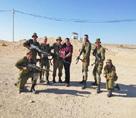



number is 157,600. The total count of the army age men is 603,550 without the tribe of Levi.
The people travel and camp with the Mishkan in their midst. Physically and metaphorically. We travel our history with G-d in our midst. While the distinct feeling you get in the detailed description of where each tribe encamped is the feeling of an army encampment, there is another layer of meaning. Yes, regimented. Specific. Detailed. Organized. But an army for which purpose? To fight the anticipated foes in the Land of Israel? Or to be the army of Hashem? A fighting army with its G-d in its midst? Or both?
Director Hadassah Jacob
052-384-7230
Monday Evenings 7:00-9:00pm
Call to check

4th aliya (3:1-13) Aharon’s sons’ names were Nadav, Avihu, Elazar and Itamar. Nadav and Avihu died without children. Elazar and Itamar serve as Kohanim with Aharon. Take the Leviim: they are to serve Aharon. The Leviim are responsible for the Mishkan: to support the Kohanim and the people, to facilitate the running of the Mishkan. The Leviim shall take the place of the first-born, who became obligated to me when saved in Egypt.
You are invited to an unusual evening in memory of Rav Yehoshua Neaman ל"ז
We are honored - our guest speaker is Rabbi Zev Leff א"טילש Rav of Moshav Matityahu
Tuesday eve March 26, 8:00pm at the OU Israel Center
Special Gifts & refreshments will be served
All welcome!
There are 2 groups mentioned here: Kohanim and Leviim. The lineage of the Kohanim is given. It just doesn’t take much room. Because Aharon is a Kohen and his sons. But he only has 2. So the entire lineage of the Kohanim is 3 people. The Leviim, on the other hand, are an entire tribe,
Every person who was not born in Israel and lives in the Holy Land should celebrate his/her ALIYANNIVERSARY annually! REMEMBER! WITH ALIYAH BLESSINGS! The NEAMANS
descendants of Levi, son of Yaakov. Their lineage, at quite some length, is given in the next aliya.
TO SPONSOR A SHIUR CONTACT
Chana Spivack - 050-229-4951 or donate online: https://www.ouisrael.org/donate/ou-israel-center/ RABBI SHAI FINKELSTEIN'S SHIUR
5th aliya (3:14-39) Count the tribe of Levi by households, from 1 month and older: the households of Gershon, Kehat and Merari, the sons of Levi. The sons of Gershon, Kehat and Merari are listed. Gershon’s family, from a month and above, is 7,500. They camp to the west of the Mishkan. Their task was to transport and be responsible for the curtains and coverings. Kehat numbered 8,600, camping to the south. They were responsible for the vessels: Aron, Menorah, Table, altars. Merari numbered 6,200, camping to the north. Responsible for the structure of the Mishkan; the walls, supports and beams. The total of the tribe of Levi is 22,000. On the front side, the east of the Mishkan, Moshe and Aharon and families camped.
Sponsored for this academic year by the Sondhelm and Wertenteil families in memory of Mel David z"l
ל"ז הקבר אביוטו ריאמ םהרבא ןב לדנמ םחנמ
RABBI ADLER’S SHIUR
Sponsored for this academic year by the Frist family in memory of their beloved daughter and sister Elisheva Frist a"h - ה"ע ןמלז תב אמיס עבשילא
RABBI GOLDSCHEIDER'S SHIUR
Sponsored for this academic year תמשנ וליעל ל''ז המלש ןב בוט םשו ה''ע םהרבא תב םירמ
REBBETZIN SHIRA SMILES SHIUR
Sponsored for this academic year by Dr. & Mrs. Menachem Marcus in memory of their parents, Rose & Dr. Emanuel Marcus z"l and Rosi & Ernest Strauss z"l
ל"ז סוקרמ השמ ןב יכדרמו ריאמ ףסוי תב לזייר
ל"ז סוארטש דוד ןב לאינדו םהרבא תב דומיל
RABBI BREITOWITZ'S TUESDAY SHIUR - MINCHAT CHINUCH
Sponsored for this academic year by Rabbi Refoel & Sharon Auman in memory of their parents Edith & Reiner Auman z”l
ד"יה לאפר תב ה"ע רתסאו ל"ז קודצ ןב הנוי and their son Rabbi Shmuel Eliyahu Auman z"l
י"נ לאפר ברה ןב ל"ז והילא לאומש ברה
RABBI GOLDIN'S SHIUR
Sponsored for this academic year by Dr. & Mrs. Menachem Marcus in memory of beloved aunts Irma Haas a"h and Hilde Myer a"h
RABBI MANNING'S SHIUR
Sponsored for this academic year תמשנ יוליעל
ל''ז ןמלק ןב גילזו ה''ע תידנרב תב הנרב
RABBI TAUB'S WEEKLY THURSDAY PARSHAT HASHAVUA SHIUR
Sponsored by The Jewish Legacy Foundation
The encampment around the Mishkan had 2 layers. The Leviim were in close, on 3 of the 4 sides of the Mishkan. The 4th side, the leading side, had Moshe and Aharon. The entire 12 tribes were farther removed on all 4 sides.
המלש האופר
הניאר תב הרוא
The 3 sons of Levi were family groups; Gershon, Kehat and Merari. They had full responsibility for the Mishkan. Their tasks fell in categories. Gershon; textiles. Kehat; furniture. Merari; building. Gershon took care of the curtains and coverings. Kehat, the important main vessels of the Mishkan. And Merari the structure of the building.
Torah Tidbits distribution is looking for the right connection to help get TT to TZFAT and KARMIEL each week
Call Toni at 0505-772-111
GET FIT WHILE YOU SIT:
6th aliya (3:40-51) Count all the firstborn of the age of a month and above. The Leviim are to replace the firstborn. There were 273 more
Exercise for ladies Sundays 12:45-1:30pm at the OU Israel Center Sura Faecher 0504153239
Resumes Oct 15th 12:30-1:15pm

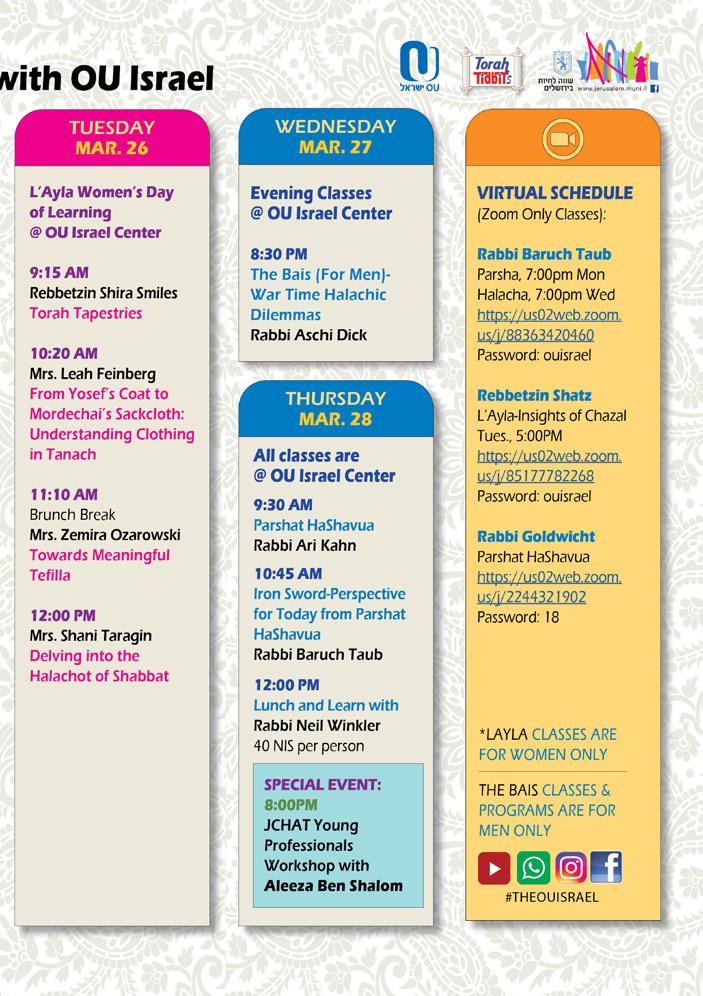

4 rooms, 113m, 2 bathrooms, porch, 1st floor, elevator, 6.2 million NIS
Tzitzit tying at the OU Israel Center with Ruti - no experience needed
Smadar 050-3114040 // 02-642-4329 smadi_bida@walla.co.il
Tuesday
Mondays at 1:30pm and Wednesdays at 12:00pm OU
Monday mornings 10.30-12.30

2109-392-072
Ariyel Maresky
Newly renovated, 4 bedrooms, 3 full baths,150 sqm, large balcony with amazing view, U/F ,heating central a/c, elevator, parking. NIS 6,465,000
Horkania Penthouse, Katamon/Rasco


2960-276-055
David Weiser
NIS 900,0005,
optimal airflow from all rfou directions. Enjoy living in this prestigious location.
This Stunning rm-5 apt offers views and
Caspi ,St Arnona
bedroom, safe room, storage unit, 3 balconies, garden, 2 parking spot, 2 rental units NIS 6,500,000
Villa 508 sqm plot, 230 sqm built, 7 rooms,
Shlomo U'Moshe Tajer St, Pisgat Ze’ev


2960-276-055
David Weiser
2 rental units NIS 6,700,000
master suite, utility room, safe room, balcony and, huge garden, 2 parking spots,
Tsiyon Garami tS, Pisgat Ze’ev ,Villa 542 sqm plot, 230 sqm built, 9 rooms





Shira Harazy 8159-337-054
Micha Paul 6340-511-205


170 Sqm, 8 ms,r 4 ms,Bathr 3
3 bedrooms, 2 bathrooms, balcony, storage and elevator. NIS 2,68,0000
Great investment opportunity - heart of BAKA!
Tsipora ,St Baka


4111-668-54
Alyssa Friedland +972

Parking, 250 Garden (Sqm) NIS 4,890,000
,tsAp Central Location, Great Investment Opportunity!
Cottage Divided Into 2 Separate Garden
Micha Paul 6340-511-052 Shim’on Ben Hamo St, Har Homa


NIS 5,200,000 ($1,500,000)
Quiet, pastoral + amazing view!
5 rooms + garden in tabu!
Mevo ,HaMa'avak French Hill Garden Home!







May your family find ways to remember the heroes of the past and celebrate the triumphs of heroes in our communities today. Wishing you a Purim of joy and generosity!
 BY RABBI MOSHE TARAGIN R am, Yeshivat Har Etzion
BY RABBI MOSHE TARAGIN R am, Yeshivat Har Etzion
A panicked Mordechai was heard shrieking in the streets of Shushan, lamenting the genocidal proclamation against the Jews. Esther, who hadn’t heard of the plot, dispatched her trusted servant named Hatach to communicate with Mordechai, who was in no condition to enter the palace precincts.
Since Hatach appears out of nowhere, Chazal claim that he was, in reality, Daniel, the elderly prophet. At this stage, Daniel would have been upwards of 80 or 90 years old, which is why the Ibn Ezra questions this Chazal. It is entirely possible that Chazal didn’t intend that Hatach was actually Daniel, but meant that Hatach and Esther acted in the spirit of Daniel. Whether Chazal meant this association literally or metaphorically, Daniel becomes part of the Purim story.
Not only is Daniel implanted into Shushan, but he launches a charming and tasty Purim custom. There are many intriguing reasons for eating hamentashen or oznei haman on Purim. The Rema in Shulchan Aruch (OC, 695:2) , however, provides the primary and most authoritative reason: hamentashen were traditionally made with poppy seed fillings. Eating poppy seed pastries recalls the lentils and seeds which Daniel consumed when he was sequestered in Nevuchadnezar’s palace during the first wave of the
Jewish exile to Babylonia. Not only does Daniel get a cameo role in the story of Purim, but his menu from 70 years earlier shapes our Purim celebration. Evidently, Daniel’s life contains an essential message of Purim.
Having all been born into a world without a Mikdash and without full Jewish sovereignty, we have all comfortably constructed our Jewish identity around numerous “other” aspects of Judaism, such as mitzvot, ritual, Torah study, chesed, community, minhagim and masorah. For those who lived through that era however, the destruction of the Beit Hamikdash and the sacking of Yerushalayim were apocalyptic events which wrecked Jewish identity. In the dark aftermath of the churban it appeared that Jewish history had ground to a halt. Having been evicted from our Land, it appeared that we would gradually vanish or assimilate into the surrounding cultures.
Haman certainly assumed as much. As an astute student of history, he realized that the Jewish people had been selected by Hashem and had enjoyed His protective Hashgacha. Haman ventured that after hundreds of years of betrayal and of religious failure we had forfeited our status as the chosen people, and were now “just like any other nation”, or as he referred to us םימעה ןיב דרפמו
- vulnerable to defeat.
The Jewish future looked bleak, and as a result, Jewish identity began to fray, and Jewish pride began to sink. The clearest signal of the decline of Jewish identity was the deterioration of the Hebrew language. Language shapes our national identity and as Jewish identity began to crumble Hebrew felt outdated and obsolete. Why would anyone speak in a dying language which had belonged to a people who were no longer historically relevant?
The decline of Hebrew is reflected in the language of the two sefarim of Tanach which detail our exile. The sections in Daniel and Ezra which portray our experiences in Babylonia and Persia are each written in complex Aramaic, making them extremely challenging to study. As these sections portray our departure from Yerushalayim and the erosion of Jewish identity it is unsurprising that they are written in a foreign language.
Just as unsurprisingly, when Daniel begins to dream of the Messianic era, the language of his sefer shifts back to Hebrew. As he envisions a future in which Jewish history is, once again, relevant, Jewish identity resurges, and Hebrew is revived. Likewise, the sections in Ezra which chronicle our return to Yerushalayim (which occurred after the Purim miracle) are phrased in Hebrew.
Language is a bellwether of identity. When Jewish identity deteriorates, Hebrew disappears. When Jewish identity is reinvigorated, Jewish language is restored.
The story of Purim occurs toward the tail end of our exile, amidst our struggle to return to Yerushalayim. Koresh, Achashverosh’s predecessor had authorized our return,

077-2050015
052-2678749
golanechasim@gmail.com
Old Katamon: 4-room
Old Katamon:
Meir Golan

RASCO: new 4 room apartment, 95m, master suite, elevator, balcony, very nice view 2,950,000 NIS
ARNONA: 3-room apartment, 73m, bright, Sukkah terrace, Shabbat elevator, fully accessible, green & quiet street 2,390,000 NIS
3 exp Shabbat elevator, parking, 3,290,000 NIS
Old Katamon: Spacious 3-room apartment in a very quiet street, 75 sqm, sukkah balcony facing a green and pastoral view, 3 exp. Shabbat elevator, private parking, storeroom, 2,690,000 NIS
BAKA: 4 room apartment, 84m, elevator, neat & nice apartment 2,790,000 NIS
ARNONA: 4-room apartment, 90m, beautifully renovated, master suite, balcony, storage, Shabbat elevator, private parking 3,250,000 NIS
ARNONA: 4-room apartment, 90m, master suite, balcony, storage, Shabbat elevator, private parking 3,290,000 NIS
BAKA: New 4 room apartment in a new building, 88m, master suite, storage, Shabbat elevator, private parking, 3,950,000 NIS
RECHAVIA: 4-room apartment, 92m, Suka balcony, Shabbat elevator, fully accessible, private parking, storage 4,400,000 NIS
BAKA: New 4 room apartment in a new building, 88m, master suite, storage, Shabbat elevator, private parking, Sukkah balcony in process of being added 3,890,000 NIS
ARNONA: 5-room apartment, 120m, balcony, elevator, fully accessible, private parking, storage 4,350,000 NIS
OLD KATAMON: 5-room garden apartment, 125m, large garden + separate unit for rent or for guests, balcony, storage 5,190,000 NIS
SHAAREI CHESED (RECHAVIA):
BAKA: 5-room garden apartment, 140m, master suite private parking, storage, full of light, nice garden, 6,000,000 NIS
4-room apartment, 130m, balcony, extraordinary view, Shabbat elevator, fully accessible, private parking, 5,590,000 NIS
OLD KATAMON: Spacious new 5-room apartment, 140m, terrace, underfloor heating, Shabbat elevator, 2 parking, 6,300,000 NIS
FOR RENT:BAKA: nice 4-room apartment, 82m, beautifully renovated, master suite, air conditioners, balcony, second floor, elevator - fully accessible, storage, 8,000 NIS
NORTH TALPIOT (CASPI STREET): new garden apartment, 5.5 rooms, 165m, 80m garden, architecturally renovated, underfloor heating, central air conditioning, parking, 5,890,000 NIS
but the project was thwarted by fierce local opposition to Jewish expansionism. As the Purim story unfolded, we were landlocked in Persia without any clear hope for a return to Yerushalayim.
Nothing better reflects the loss of Jewish language than the lack of Jewish names. The name “Mordechai” is a Persian name taken from an ancient Mesopotamian/Babylonian god named Marduk. According to Chazal, Mordechai had alternative Hebrew names such as Petachya, but in Shushan he goes by his Persian-sounding name. The same is true for Esther, which comes from the Persian word “Istarhan” which describes a planet. As “Esther” is a Persian word, the Megillah must translate it by informing us that she also had a Hebrew name – Hadassah. רתסא איה הסדה. Both Mordechai and Esther are referred to by their Persian names, even though they had
nice Jewish names. Hebrew appeared to be obsolete, so why bother to use those names?
The names of the months in Megillat Esther further indicate how deeply Persian language penetrated our identity. In this story the Persian names of the months (such as Adar and Nissan) make their debut, replacing the traditional Hebrew nomenclature of chodesh rishon or chodesh shneim asar. Central characters of Purim are referred to by their Persian names, the calendar is Persian, as Jewish identity continues to fade away.
The most powerful indicator of the decline of the Hebrew language are the letters of the Megillah. Letter writing in Persia wasn’t just a practical process, but was a culturally iconic procedure. Before the emergence of multi-regional empires, monarchs could dispatch personal messengers to communicate with their citizenry. With the development of a multi-regional empire, which stretched across 127 provinces, letters were necessary to communicate with subjects in the far reaches of the kingdom.
Because Achashverosh understood the import of letter writing, he refused to rescind his murderous letter. The cancellation of even one royal communique would cast suspicion on the authority of all future letters and
would sink his kingdom. When receiving royal letters, subjects who lived too far from Shushan to have ever met the king, would wonder if his letters still carried validity. Achashverosh couldn’t allow this.
Because letters were so crucial, the letter writers and letter carriers were skilled writers and were also members of the noble class. The well-known description of ינב םינרדשחא םיכמרה highlights the fact that a person could not become a letter carrier or an ןרדשחא unless their father was a senior letter official or a ךמר. Crafting letters and transporting them were new skills which enabled the expansion of the Persian kingdom. Letters in Persia were cultural icons.


As Persian was a multi-cultural and multi-lingual empire, the first two letters of Megillat Esther were translated into every possible language. Every language that is, except for the one language which appeared to have expired, namely Hebrew. Perhaps the lowest point of our exile occurred in the third perek of Megillat Esther when the letter threatening the genocide of Jews was promulgated in every language except the dead language of a historically irrelevant and soon-to be extinct people. At this stage, Jewish identity and pride reached their nadir. Even if we could, somehow, avoid annihilation, the hope of a return to Yerushalayim never seemed more distant.
We rallied. We gathered together to fast, pray and to fight for Jewish survival. Though Hashem’s hashgacha wasn’t explicit, behind the scenes, He choreographed our redemption. Quickly, everything turned around as we went from victim to hero. Rather than being persecuted, we were lauded by Gentiles
and Jewish pride surged. Suddenly, horizons of hope and a future opened wide. Unlike the first letters which weren’t translated into Hebrew, the final letter announcing Jewish triumph was translated into Hebrew.
לאו ֹו נֹׁש לכ םעו םעו הבתככ הנידמו הנידמ :םנושלכו םבתככ םידוהיה
As Jewish hope and pride were restored, the Hebrew language was resuscitated. Unlike Sefer Daniel and Ezra whose galut chronicles were written in Aramaic, the events of Purim in Megillat Esther were recorded in Hebrew. Purim restored Jewish pride and Jewish spirit, and this national energy enabled our final return to Yerushalayim. Purim provided a thrust of national identity to propel us back to Yerushalayim.
Which brings us back to Daniel. 80 years earlier he made a stand. Trapped in the palace and expected to eat royal food, he understood the power of food to shape identity. If he ate Babylonian food and spoke Babylonian, he would become a Babylonian. Daniel courageously defied Nevuchadnezar’s orders, refusing to eat palace food. He conspired with palace guards to smuggle high-protein lentils and seeds thereby avoiding a lobotomy of Jewish identity. As he was the first to make this heroic stand in defense of Jewish identity, he is “invoked” in Megillat Esther and we celebrate his defiance by eating hamentashen to recall his bravery.
Zalman Shazar10, Ir Yamim
Mail: Alon@Next-Home.co.il
Website: www.Next-Home.co.il
ALON: 972-53-631-3131
CHANA: 972-58-721-8373
NEXT HOME - Netanya by the Sea. We work with money changers, mortgage brokers, banks, lawyers, and other realtors in Jerusalem, Tel Aviv, Herziliya, and Caesaria. For first time home buyers, renters, or investors, NEXT HOME will find the right property for YOU
Ir Yamim, Uzi Hitman, apartment faces Nature Preserve,135m, first line to the sea, 2 underground parking spaces, 2 storage spaces, pool and gym
Ir Yamim, Arik Lavi project Gindi 5.5 room apartment, 4th floor, 145m plus attached storage, 2 parking spaces at a great price
Ir Yamim, Dudu Dotan, a very wellinvested dream penthouse, 180m, adjacent storage, 2 parking spaces, 35m balcony overlooking the sea Ramat Poleg, a large private house built 250m, with a yard of 100m at an excellent price
Ir Yamim, Ehud Manor, a huge apartment about 200m, large balcony, first line to the sea, pool and gym Jerusalem, city center, 140m apartment, 40m balcony, view of city and Western Wall, Close to the Great Synagogue

My grandmother, Rebbetzin Elaine Wolf a”h, often shared two expressions which dovetail well with each other: “may Hashem protect us” and “may Hashem surround you with good people.” These mantras resonate as we delve into the lessons embedded in this week’s Maftir and Haftorah readings, exploring interactions between Bnei Yisrael and two nations. The concluding verses of Parshat Ki Teitzei instruct Bnei Yisrael to eradicate Amalek, the only Torah mandated reading.
The story of the Jews’ obligatory war against Amalek as recorded at the end of Parshat Beshelach is immediately followed by the narrative of Yitro’s visit to the Jewish nation. The Haftorah discusses the Keini, descendants of Yitro, and their imperative to distance themselves from the nation of Amalek to avoid annihilation.
Examining the stark contrasts between Yitro and his family, and the nation of Amalek as depicted in the Torah and in Sefer Shmuel, we encounter messages which resonate until this day. Yitro, a Midianite priest, extends hospitality to Moshe, providing refuge and eventually gives his daughter, Tzipora, to Moshe in marriage.
Later, after the Jewish nation receives the Torah at Sinai, Yitro advises Moses on delegating judicial responsibilities, thereby lightening
Moshe’s burden of solitary judgment. Yitto’s counsel underscores his concern for communal welfare and the importance of collaborative leadership. In stark contrast, the nation of Amalek, attacks the Jewish nation at the start of their desert journey, epitomizing moral depravity through unprovoked aggression. They ambush Bnei Yisrael, targeting the weak and defenseless—an act condemned by the Torah, resulting in the mandate of the eradication of Amalek’s memory from the earth.
The disparity between Yitro’s family and Amalek is further illuminated in Sefer Shmuel. While Yitro’s descendants embody righteousness and honor, the nation of Amalek persists in hostility and aggression against Bnei Yisrael. King Shaul is commanded to eradicate Amalek but does not follow Hashem’s directive. He does however, address the descendents of Yitro, directing them to separate from Amalek lest they be caught in the destruction. The Abarbanel highlights the long lasting impact of our deeds on our immediate family and on others. The chesed conducted by Yitro, protected his family for many generations while the evil of Amalek continued on for centuries. These two nations reflect opposite approaches, but underscore how the choices we make now have far-reaching effects.
May our efforts to eradicate the evil of
The Magid of Dubno (Jacob ben Wolf Kranz 1741-1804) explains that Avraham watched how he spoke in this tense situation in order to, both, state his truth and be able to keep the peace -Shalom Bayit. Avraham said, on the one hand, “I am a Resident’ due to G-d’s promise to receive this Land and on the other hand, I still need your agreement to purchase a plot. In other words, Avraham implied “I am the resident” and you are the “strangers”, while they understood him as saying that “they” are the residents and Avraham is the stranger. The peace was kept, and Avraham remained true to his ideals.
Shabbat ShalomAmalek be recognized and may Hashem protect us from their ways. At the same time, may Hashem surround us with good people like Yitro and his descendants.

12 TORAH TIDBITS 1440 / CHAYEI SARA 5782
Your place for extra space
053-7272-815

**SALE! NEW LISTING! Old Katamon 3.5 beds, 95 sqm + 35m balconies, 1st floor. New Tama building in progress 4,200,000 ₪
**SALE! Rechavia, KKL St. exclusive complex. 89 sqm. 2 beds apt. Including indoor pool, and 24 hr security. Parking and storage. 3,800,000 ₪
**SALE! Rechavia, Diskin St. 130 sqm. 3 beds + 2.5 baths + private parking. Facing city view. Needs renovation. 5,700,000 ₪
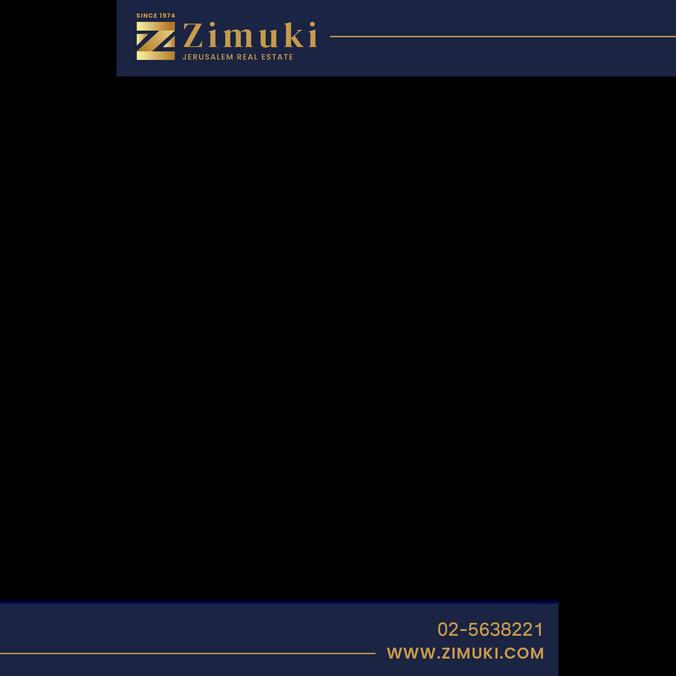
**RENTAL! Nayot, Davidzon St. 100 sqm, 4-beds, 1st floor + elevator. Furnished or empty. Immediately. Short/long term. 7,900 ₪
**RENTAL! Talbiyeh, 130 sqm penthouse. 3.5-beds, F/F, large terrace, private parking + storage. 13,000 ₪
Ruth Abrahami - 054-8070677

Taanit Esther is the same day whether you celebrate Purim on the 14th or the 15th of Adar. Taanit Esther is Thursday, March 21. The fast concludes in Jerusalem at 6:09pm.
Zeicher L’Machatzit Hashekel can be given at Mincha of Taanit Esther or before Megillah reading. Common amount is 3 half-shekel coins. Some give the value of the original silver half shekel, which at today’s price of silver and the current exchange rate is around 20NIS. Remember - we don’t give Machatzit HaShekel without a Beit HaMikdash, we give ZEICHER - commemorative of it.
AL HANISIM is said in the Amida in the B’RACHA of MODIM and in Birkat HaMazon in the B’RACHA of NODEH L’CHA. If you forget AL HANISIM in the Amida, do NOT repeat it. If you catch your omission before HaShem’s name in HATOV SHIMCHA... go back and say it. If you already said HaShem’s name, finish the Amida and before you say YIHYU
L’RATZON... and take your steps back, say Al HaNisim with a modified opening sentence:
תואלפנו םיסינ ונל השעי אוה ןמחרה ןמזב םהה םימיב וניתובאל השע רשאכ רתסאו יכדרמ ימיב .הזה
Similar for Birkat HaMazon. Before HaShem’s name in AL HAARETZ V’AL HAMAZON, go back and say it. After HaShem’s name, continue until right before HARACHAMAN HU Y’ZAKEINU and say it with the modified opener, as above.
FROM HERE TO THERE: Jerusalemites who go outside for 14 Adar and outsiders who come to Jerusalem for Purim should ask a Rav what is and is not required of you on the other day.
TORAH READING is taken from the end of B’shalach - VAYAVO AMALEK... If you missed ZACHOR, you should ask the Baal Korei to have the Mitzvah of ZACHOR in mind, and you should have KAVANA likewise.
MEGILLAH READING is required TWICE, at night and in the day. KAVANA should include the Mitzvah of Megillah and the publicizing of HaShem’s miracles. The b’racha of SHEHECHEYANU in the morning covers the other mitzvot of the day. (Have them in mind.)
MATANOT LA’EVYONIM are gifts to the poor (be generous, more than you spend on Mishlo’ach Manot). Best to give on Purim day. Giving it earlier to someone who will distribute it on Purim day is also acceptable.
MISHLO’ACH MANOT are gifts of foods (min. two kinds) to friends (or just other Jews) - who are observing Purim the same day you are. One Mishloach Manot is sufficient, but most people give multiple times.
excessive drinking turns out not to be in line with SIMCHAT PURIM. Be careful. And watch out for your family members.
SEUDAT PURIM is a festive meal in the afternoon of your Purim day.
DRINKING: The proper custom on Purim is to drink more wine than you usually do. A bit more is sufficient. In most cases,
See Rabbi Daniel Mann’s article concerning the unique halachot of Purim on Motzai Shabbat p52-53

תמשנ יוליעל
ל"ז ןמצלז לאיזוע םהרבא ןב םירפא לאוי
Question: What should we know about the transition from Shabbat to Purim this year (outside Yerushalayim)?
Answer: There are no major issues, but there are a few that are worthwhile to raise.
Normally, it is forbidden to eat a half hour before the time for Megillah reading (Mishna Berura 692:15; see Shulchan Aruch, Orach Chayim 235:2), which is tzeit hakochavim. However, since seuda shlishit is a mitzvah and it freezes, in some ways, the coming of the next day, one may continue to eat until tzeit hakochavim (Mikraei Kodesh (Harari), Purim 4:5 in the name of Rav Mordechai Eliyahu). Using one’s standard assumption of when tzeit hakochavim is (not including the extra time for ending Shabbat), he might have to finish slightly before usual. There may also be a slight advantage to finishing eating bread by sunset or at least tzeit hakochavim to avoid the question about whether he should be saying Al Hanissim in Birkat Hamazon (see Mishna Berua 188:33). In any case, one should not recite Al Hanissim even if he bentches after tzeit hakochavim (ibid.).
It is generally forbidden to prepare (hachana) on Shabbat for Motzaei Shabbat, even for a purpose of an after-Shabbat mitzvah (see Mishna Berura 667:5). However, one
may prepare the laining on Shabbat even from a Megillah scroll (it is therefore not muktzeh – Mishna Berura 688:18). It is forbidden to bring the Megillah to shul on Shabbat, even if there is an eiruv, due to hachana (Chayei Adam II:155:10), unless he will read/learn from it before Shabbat ends (Sha’arei Teshuva 693:2; see Machazei Eliyahu 58).
Rishonim debate whether to read Megillat Esther in shul before or after Havdala (see Darchei Moshe, OC 693:2). The opinion accepted both by Ashkenazim (Rama, OC 693:1) and Sephardim (see Chazon Ovadia, Purim p. 68) is to read the Megillah before Havdala. The Levush and Gra (to OC 693:1) say the reason is to delay the exit of Shabbat (based on Pesachim 105b) despite the preference that we usually do the more common mitzvah first. This is one of the factors in the machloket whether to light Chanuka candles before or after Havdala (see Mishna Berura 681:3 and Be’ur Halacha ad loc.). Some say that the matters are fully equivalent, and in both areas, in shul one does Havdala after the present mitzvah, whereas at home there is more reason to do Havdala first (Da’at Torah to 693:1). Some say that Megillah reading has a special status of pirsumei nisa that exceeds even that of Chanuka candles (Imrei Esh, OC 53).
Another machloket is, given that Havdala is done after the Megillah, whether one should at least make the beracha on fire
Eretz Hemdah, the Institute for Advanced Jewish Studies, Jerusalem, is headed by Rav Yosef Carmel and Rav Moshe Ehrenreich, founded by Rav Shaul Yisraeli, zt”l, to prepare rabbanim and dayanim to serve the National Religious community in the Israel and abroad. Ask the Rabbi is a joint venture of the OU, Eretz Hemdah, and OU Israel’s Torah Tidbits.

before that. The Kolbo’s (41) first opinion is that we should thank Hashem for light before benefitting from it during the reading, and this is the minhag of most Sephardim (Chazon Ovadia ibid. p. 67). Ashkenazim follow the Kolbo’s second opinion, that there is no problem with using light before the beracha, as that requirement is fulfilled every morning, and here it is a general praise for Hashem’s introducing fire to Adam (Pri Megadim, MZ 693:1, based on Maharsh Halevi, OC 28).
There is an apparently relatively recent practice, with significant upside in many communities – to hold Ma’ariv on Motzaei Shabbat/Purim well after its regular time. This gives families the time to prepare for Megillah reading (including driving, getting kids’ costumes on, etc.). It is possible to make Havdala before Ma’ariv, including the Havdala candle, after making a declaration of ending Shabbat, at the proper time (see Mishna Berura 294:1). Under these circumstances that many people will be doing significant melacha before Ma’ariv, it is likely also worthwhile to do full Havdala (see Shulchan Aruch, OC 299:10).


There is no problem here doing Havdala before Megillah reading, considering that the communal reading is not ready to be done yet (one should not eat other than drinking the “Havdala wine”). In shuls that never do Havdala on Motzaei Shabbat, there should be no need on Purim. For those shuls that recite Havdala, it is best that one who has not yet recited Havdala do so.

Do you have a life insurance policy you:
• No longer want?
• No longer need?
• Can no longer afford the premium?
• Could you use extra money instead of keeping your policy?
I can guarantee that if you qualify with the underwriting process I can get you more money than if you cash it in with the company.
Please contact Moshe Russell at: Buymypolicy32@gmail.com
New Price - Rechavia
Ground floor completely accessible, spacious & airy, 4 rooms, 10m mirpeset, parking, tons of potential, 2 entrances so the 3rd bedroom can be used as a clinic /office or studio unit. 3.97m shekel
For Rent in Rechavia
Rashba street, 2 rooms, 50m, 1.5 bathrooms, mirpeset, small building, 12 stairs up. available from April. 5670 NIS/month
For Rent in Katamon






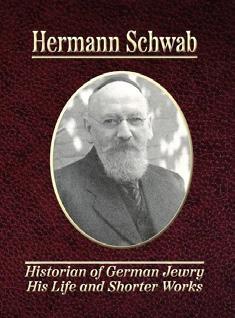
Prolific writer, historian, and community leader, Hermann Schwab – as witness to an era filled with Torah and upheaval – invites readers to experience Jewish life in those turbulent times. Through a sampling of his astute writings, you will learn of the unique impact of Rabbi Samson Raphael Hirsch, about daily Jewish life in rural German towns, encounter the clash of conflicting ideas that swept through Europe, and come away with a profound understanding and appreciation of the recent Jewish past.
Distributed by Feldheim Publishers
Available at Jewish bookstores or at https://www.feldheim.com/hermann-schwab

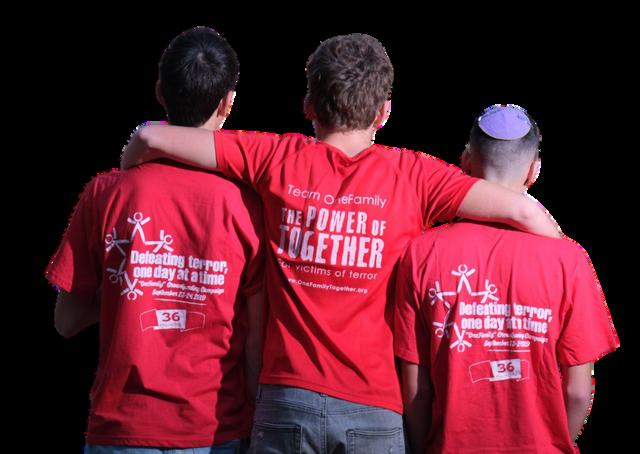

Family is the circle of people we know we can count on to be there when we need it most.
We are a support system of people and resources to empower terror victims to heal, recover, renew their lease on life, and flourish.
OneFamily – helping “Our Collective Family” achieve emotional and economic independence

The Book of Leviticus introduces us to the various sacrifices that were offered in the Temple. Although the rite has lapsed on account of the Temple’s destruction, in a sense the sacrifices live on. The Rambam clarified that prayer is a biblical commandment, but the obligation to pray three times a day is a rabbinic institution based on the daily sacrifices.1
But why did the Sages decide to divide the day according to the timing of these sacrifices? Furthermore, why does the Talmud say to take extra care with Minchah, and then add “even with Maariv” and “even with Shacharit”—why not formulate a general rule that we should be deliberate in prayer?2
Rav Avraham Yitzchak HaKohen Kook taught that the prayers are strategically placed throughout the day to address the challenges its different periods bring. Eliyahu, determined to convince the nation to fortify their faith in God and to reject the evil worship of Baal, was answered by God on Mount Carmel during the time for Minchah. By and throughout the afternoon, we are exposed at the workplace or in managing our daily affairs to views and behavior that are antithetical to the Torah and morality. Rav Kook
1. Sefer ha-Mitzvot, mitzvat aseh §10, and see Berachot 26b.
2. See Berachot 6b.
called Minchah an act of hashavat avedah, returning a lost object, because it brings us back to ourselves, spiritually recentering us.
Night is a time when we are tempted by passion and sin, our thoughts run wild. Our spiritual adversaries in the dark arise internally and of their own accord, without an immediate external stimulus. The Jew seeking to live dignifiedly must protect himself from them, and Maariv helps us to strengthen our resolve.
The morning does not immediately beset us with challenges from without and within. But spiritual battles are in the offing, and Shacharit serves as a reveille that rouses the troops. The best way to fend off what the day will throw at us is by preparing ourselves “to think sublime thoughts with rectitude and integrity, love and fear of God.”3
The prayers are timed as they are because prayer elicits within us a heightened spiritual awareness of dangers and possibilities that belong to different parts of the day. When we pray, we are reminded that if we put in the effort, God helps us persevere whatever comes our way.
Prayer requires us to peer inward. Rav Kook wrote beautifully:
Prayer is a great self-examination.4
3. Ein Ayah, Berachot, 1:60.
4. Musar Avicha, Me’ein Hakdamah, sec. 3.
םדאל לֹודג הקידב איה הליפתה הנהו
Prayer calls the soul to its purpose.5
הדיקפת תא המׁש נהמ תׁש קבמ הליפתה
Daily prayer forces us to take a hard look at ourselves a few times a day, to recommit to our ideals and principles, and to overcome obstacles that impede our growth. One of the outstanding Talmudists of this past century, Rabbi Isser Zalman Meltzer, confirmed that his friend Rav Kook lived his own teachings. “If only I could pray Neilah on Yom Kippur,” he wished, “with the holy trepidation and emotion that the Rav prays Mincha every day.”6
Centuries ago, the author of the classic work of exposition of the 613 commandments, Sefer ha-Chinuch, argued that certain mitzvot were established expressly to help safeguard a person from negative influences and pressures. He listed tefillin, regular Torah study, tzitzit, and the mezuzah.7 Rav Kook later argued that daily prayer belongs on this list.
Rav Kook was intimately familiar with our mystical tradition, which conceives of prayer as having a potent spiritual effect on the upper worlds of the divine emanations, the sefirot, yet he chose to focus on how prayer affects the one saying it. His approach is similar to that of other great thinkers, such as Rabbi Shimshon Raphael Hirsch and Rabbi Joseph B. Soloveitchik, who noted that the Hebrew word for praying is the reflexive lehitpalel, signaling that prayer acts on ourselves. The late Rabbi Lord Jonathan Sacks argued that “prayer changes the world because it changes us.”8
5. Siddur Olat Re’iyah, 1:11.
6. Raz, Angel Among Men, 312.
7. Sefer ha-Chinuch, §421.
8. Rabbi Lord Jonathan Sacks, “The Power of Jewish Prayer,” Jewish Action, Fall 2009 (5770), https://jewishaction.com/religion/inspiration/ the_power_of_jewish_prayer/ (accessed March 17, 2021).
Mazal Tov to Valerie Seidner and family on the marriage of her granddaughter, Hodaya
Rebbe Yehudah Aryeh Leib Alter, the second Gerrer Rebbe, once told his Chassidim that when we say the words “please, God” (אנא ׳ה) in Hallel, “it is an auspicious time for all of one’s prayers to be answered.”9 Since we divide Psalms 118:25 in two, and each phrase begins with “please, God” (׳ה אנא), the Chassidim themselves were divided about which phrase the rebbe meant. Did he intend “please, God, save” (אנ העיׁש וה ׳ה אנא) or “please, God, grant success” (אנ החילצה ׳ה אנא)? The rebbe’s son, the Imrei Emet (Rebbe Avraham Mordechai), realized that both camps were wrong. His father had in mind an entirely different verse altogether. Earlier in Hallel, we beseech, “Please, God, for I am your servant” (׳ה הנא ךדבע ינא יכ) (Psalms 116:16). When we gaze inward and truly feel that we are dedicated to God and His Torah, God helps us be the better servants that we pray and yearn to be.10
Rav Kook emphasized that the heights of prayer are achieved when we come away inspired. Daily prayer strengthens our resolve to be truer to our ideals and principles and can help us overcome obstacles that impede our growth. Prayer rouses us to live life with a greater sense of faith in ourselves and to gain a glimpse of God’s endless faith in us.
9. Weiss, Rav Asher Weiss on the Parashah, 1:252.
10. Ibid.
Rabbi Goldscheider is the author of the newly published book ‘Torah United’ (OU Press), featuring divrei Torah on the weekly parasha from Rav Kook, Rabbi Solovetichik, and the Chassidic Masters.
Mazel Tov to Jo & David Odes and family on the engagement of their son, Gidon




































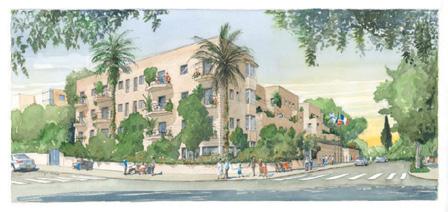
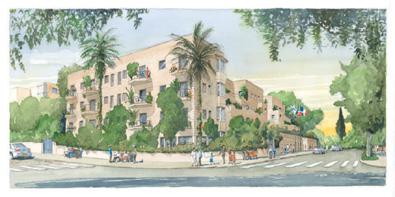







Last time we discussed the way that halacha approaches new realities and the Poskim have to investigate how to utilize new technologies. One example of this is the way that these halachic experts examined and accepted reproductive treatment.
When in-vitro fertilization (IVF) was first developed and the first IVF baby, Louise Brown, was born on July 25th, 1979, the entire world had to re-examine the definition of conception, relationships between parents and children and many related issues.
For observant Jewish couples, who wanted to use reproductive technology and undergo IVF, the questions and dilemmas were amplified. The Poskim were required to investigate the specifics of the activities inside the clinic, recognize the problems and suggest solutions.
PUAH spearheaded the efforts to ensure that all couples would have access to this technology and that no couple would say that the reason that they did not have children was because the halacha served as a barrier to their utilizing reproductive treatment.
One of the major contributions to this was the development of the system of supervision. PUAH places highly trained supervisors in fertility laboratories who very closely monitor all activity to ensure that there is no possibility of human error. The recent tragic case of the girl born to a couple in Israel who were
not the genetic parents illustrates the need for such supervision.
We have discussed in the past the rationale behind such supervision and the exact role of the supervisor. We have also highlighted the incredible dedication that they have, and how essential they are in overseeing the entire process and providing the couple with the confidence that they can proceed with treatment, in the knowledge that there is close supervision throughout the entire process.
PUAH has been supervising fertility treatments worldwide for over 30 years, developing a rapport with the embryologists and laboratory directors, and working together to create the best working environment and highest medical and halachic standards.
All of this was altered by the Covid 19 pandemic. The labs became much more sensitive about enabling supervisors to enter the lab which needed to be preserved in a sterile environment. The initial thinking was that the least number of people entering the laboratory the better and the less likelihood of infection.
There were calls to limit the supervisor’s access and mobility. Using our good connections and positive relationships, PUAH was able to continue to supply supervision at the highest standard, while giving very specific guidelines as to how to adapt to the new reality.
More on this next time.




Israel is our home, our place, belongs to all of us
Israel Properties is here to help you find your home, where you belong




































n Install the new ISRAELB APP from the google play store to your phones (Dedicated in memory of Elchanan Yosef ben Chaim Eliezer)














n Advertise on our new ISRAELB BUSINESS CENTER to gain exposure for your business











n Use IsraelB to help you SELL OR RENT OUT YOUR PROPERTY




n We can help you WRITE SPEECHES AND DIVREI TORAH for family events & Smachot
n Use IsraelB to ORGANIZE, PROMOTE AND PUBLICIZE your events and Smachot




Subscribe to our IsraelB newsletter, follow us on Twitter (@IsraelBayit) and join our Facebook Page & Groups. (Links on IsraelB.org)







IsraelB is your resource for jobs, events, community news, shiurim and much more!
CONTACT BENJY SINGER: benjysinger@israelb.org or 053-285-1526









 BY RABBI MOSHE BLOOM en.toraland.org.il
BY RABBI MOSHE BLOOM en.toraland.org.il

On Simchat Torah, I was called up for reserve duty as the rabbi of a battalion, where I’ve served for the past five years. We protected the northern border for nearly five months and are slated to return later this year. Serving as a battalion rabbi in the reserves is fascinating and multifaceted: overseeing kashrut, issuing rulings on Shabbat observance, erecting an eruv for soldiers in the field, and providing religious items such as tzitzit, tefillin, siddurim, chumashim, and sifrei kodesh, including bringing a sefer Torah to soldiers in the field. Duties also include addressed halachic and hashkafic inquiries from both religious and non-religious soldiers, boosting morale by providing a perspective of faith, and building relationships with all of the soldiers, especially with the non-religious. We also trained to care for fallen soldiers, but Baruch Hashem, no casualties occurred in our brigade.
It was intense work, and I encountered soldiers eager to explore Judaism’s perspective

on various matters and to hear the rabbi’s guidance. Given my affiliation with Torah VeHa’aretz Institute, I also fielded inquiries from soldiers, officers, and army rabbis across the country, including those in Gaza, regarding land-dependent mitzvot. Some questions I received include:
• Our tank division was stationed near a pomelo orchard on the northern border. Are we permitted to pick and eat pomelos? Must we separate terumot and ma’aserot?
• Civilians (with a non-religious appearance) brought fresh fruit to the settlement where we were stationed when I wasn’t there, so I couldn’t ask if they are tithed. Do I need to separate terumot and ma’aserot? If the fruit was already distributed and not in one place, can I still separate terumot and ma’aserot?
• Civilians were evacuated from a kibbutz adjacent to the border. May we pick lemons from their yard, or is that considered stealing? If not, how can I determine if the tree is orlah? Are the trees considered hefker, exempting them from terumot and ma’aserot?
• I’m in the battlefield without a phone or siddur and wish to separate ma’aserot from produce I received. Can I use an
abbreviated text?
• I have a siddur but no wallet or coin for chillul ma’aser sheni (5784 is a ma’aser sheni year). Who can assist me with this?
• At the beginning of Adar II, a soldier contacted Torah VeHa’aretz Institute, inquiring if coins for chillul ma’aser sheni are still appropriated for soldiers.
• G-d willing, we will delve into some of these questions in the upcoming weeks.
Walking down King George St. in Jerusalem and want a cold bottle of water?
Come help yourself to a bottle at 52 King George.
In loving memory of Yoni’s wife
Tziporah a"h, a true Eishes Chayil, always full of chessed, kindness and laughter, and brought life and strength to so many people, that she touched! She was like Aron, who loved peace and pursued peace.

Yoni thanks Hashem for having the opportunity of having Tziporah in his life, to learn of her caring, patience and happiness, to overcome her challenges. May Tziporah's Neshama be a light onto the world, in a time of darkness, and may her Neshama shine to Gan Eden. Yoni misses Tziporah with tears in his eyes, as Hashem gave him a gift, a crown jewel, now he returns her to Hashem. With thanks and Toda. Love, Yoni
To help refill the supplysend tax deductible donations for Be’er Tziporah a"h Bottled Water Gemach to Chabad of RechaviaRabbi Yisroel Goldberg email
Rabbi@JerusalemChabad.org
02 800-1717
www.JerusalermChabad.org/DonateShekels


See What We Do and to Donate: www.Yeshezra.org
Bank transfer: Mercantile (17), Branch 642, A/C 79747843
Send Asmachta for tax receipt
Checks: “Yesh Ezra,” POB 31476, Romema, Jerusalem
Credit Card: Sara – 077-820-0196.
Sun/Mon/Wed (10:15am-2.45 pm)
Inquiries: Menachem Persoff
050-570-1067 | menpmp@gmail.com
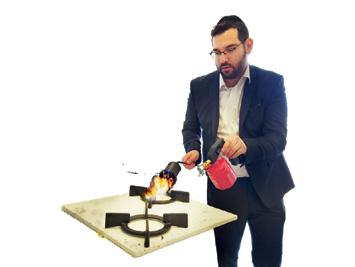



Still haven’t taken care of writing your Will?
Meet EZwill – your online Will creation service!

Simple & secure Affordable Step-by-step guide Option for Halachic addendum
Created and supported by an Anglo-Israeli lawyer with 15+ years experience
Visit www.ezwill.co.il and finally get it done!

Place orders until April 14
Get 5% off when you place order by April 10

 DR. ARIELLA AGATSTEIN
DR. ARIELLA AGATSTEIN
Sefer Vayikra begins with G-d calling to Moshe and speaking to him about the laws of the תונברק.
ארקיו
As we all know, the alef in the word ’’ארקיו’’ is smaller than the rest of the letters. Rashi, in the first commentary he writes on each book of Torah, always tries to teach us about G-d’s love for the Jewish people. Sefer Vayikra is no different. Rashi explains that ארקיו is a word which connotes love. In fact, before speaking with all of the Jewish prophets, the language of האירק is always used first. This, states Rashi, is in contrast with the way in which Hashem appears to the non-Jewish prophets, With them, the word רקיו- (without the א at the end), meaning G-d “happened upon” speaking to the prophets. Rashi explains that this was Hashem’s way of speaking to non-Jewish prophets such as Bilaam, a ןושל of impurity.
Rabbi Binyamin Lau explains the difference between ארקיו and רקיו and writes that when G-d calls to mankind, as he did to Adam HaRishon, he asks him to identify himself.
׃הכיא ול רמאֹיו םדאה־לא םיקֹ לא ’ה ארקיו “And G-d called to Adam and He said: Where are you?”
ט:ג תישארב יכנא םֹריע־יכ אריאו ןגב יתעמׁש ךלק־תא רמאֹיו אבחאו
And he [Adam] said: “I heard the sound of You in the garden, and I was afraid because I was naked, so I hid.” (י:ג תישארב)
Man is not accustomed to having G-d speak to him, and instead of coming closer to G-d, upon hearing G-d’s call, mankind frequently tries to hide from Him. The purpose of Sefer Vayikra is G-d explaining to human beings how to draw close to Him. That is why the word ןברק, “sacrifice”, comes from the shoresh of ברק- to draw close. Rather than the human reflex to create distance from G-d, out of pure trepidation, in Sefer Vayikra, G-d tells man that within that trepidation, a closeness with Hashem can be created.
Perhaps prophets are not the only ones that are meant to learn from this idea of ארקיו- of drawing close to G-d’s call. When reading these words, perhaps we too are meant to reflect about G-d’s personal callings to us. Sometimes, G-d calls to us, asking us to rise and respond to an opportunity. Sometimes, He “calls” to us in the form of blessings. “What will you do with your blessings?” Will we be filled with pride and egotism? Will we forget Hashem and begin to believe “my power and strength of my hand” led me to this blessing? Sometimes He calls to us in the form of what seems to be the harsh blow of a shepherd’s staff, a wakeup call, a difficulty we face. Will we distance ourselves from G-d at such moments, or will we rise to His call and draw closer despite the pain? As Jews, we are meant to look at world events in light of such “callings”- reaffirming that
Hashem runs the world and speaks to us at every juncture in history.
As opposed to ארקיו, the word רקיו, mentioned by Rashi, connotes a completely different relationship with G-d and the world.
The word רקיו is similar to the word הרק, “happen”. This word describes a world in which such closeness with G-d is not possible- a world with no direction and purpose, but rather a stream of random occurrences.
The world view is then a world which lacks order. The Jewish way, the way of the Torah, the world of ארקיו is one which focuses on הנווכ, intention, while the world of רקיו is one which is filled with a lack of control.
This Shabbat, we read רוכז תשרפ. The Torah tells us in חי–זי:הכ םירבד: םכתאצב ךרדב קלמע ךל השע־רׁש א תא רֹוכז ־לכ ךב בנזיו ךרדב ךרק רׁש א )חי( ׃םירצממ םיקלא ארי אֹ לו עגיו ףיע התאו ךירחא םילׁש חנה
“Remember what Amalek did to you on your way when you left from Egypt- how he happened upon you on the way, and struck the rear part of you, all who were feeble behind you, when you were faint and weary; and he didn’t fear God.”
The word to describe Amalek’s attack on the Jewish people is ֜ךרק- “he happened upon” the Jewish people. Rav Binyamin Lau explains that Amalek fought against the Jewish people, simply “because”. There was no specific reason to fight the Jewish people other than because they simply could. As we say in Hebrew םתס- “because”. Amalek would simply sneak up on weaker enemies, attack and leave.
In Megillat Esther, Haman is identified as a descendant of Agag, the king of Amalek. He too, attacked the Jewish people, simply because he could. He wanted them to be
weak. It wasn’t for a strategic reason. After all, we know much of the Jewish people were assimilated in the times of the Megillah. Instead, Haman wanted to kill the Jewish nation simply because.
This difference between ארקיו and רקיו is hinted to in the Megillah.
תׁש רפ תאו והרק רׁש א־לכ תא יכדרמ ול־דגיו ךלמה יזנג־לע לֹוקׁש ל ןמה רמא רׁש א ףסכה )ז:ד רתסא תליגמ( ׃םדבאל םידוהיב
“And Mordechai told him [Hatach] about all that had happened to him, and the account of the silver that Haman had said to weigh to the king’s treasuries for the annihilation of the Jews.”
The language used by the Megillah to describe Haman’s evil plan hints at the approach of Haman the Amaleki. To Haman, all was happenstance: Power was up. Power was down. He lacked the relationship with Hashem to give him a proper sense to view world events.
At the end of the Megilla, however, we read: ׳רקיו ןוששו החמשו הרוא התיה םידוהיל’
“For the Jews there was light and happiness, and rejoicing and honor”
The word רקיו - is a double entendre. Although it means “honor”, it’s the Megillah’s way of nodding to the fact that we overcame Haman’s רקיו- random- view of the world. As a nation, when we heard about the terrible decree against us, we knew it was not random. Rather, we did teshuva, fasted, and drew closer to G-d’s wakeup call.
The Purim story is meant to negate the Amaleki view of the world. As a nation, we are meant to recognize G-d’s purposeful Hand throughout history. Furthermore, as individual Jews, G-d calls to us every day. Our life is designed with an infinite
amount of הנווכ- intention. Everything has a purpose. The tests we face, the people we meet, the national events which happen to us as a people, are all meant to be callings from G-d. May we always have the wisdom to hear G-d’s directed call, and the courage and strength, like Mordechai and Esther, to use those callings as opportunities to grow closer to Him.
Dr. Ariella Agatstein has been involved in Jewish educational leadership for over 20 years. She received her Doctorate in Jewish Educational Leadership from Azrieli Graduate School, focusing her thesis on the religious development of Modern Orthodox high school students. Dr. Agatstein has taught Limudei Kodesh in various schools throughout the Unites States and was the Assistant Principal of Girls Judaic Studies in Yeshivat Yavneh of Los Angeles. She subsequently moved with her family and children to Jerusalem where she became an Eshkolot Fellow at the Matan-Sadie Rennert Women's Institute for Torah Studies. Dr. Agatstein continues to lecture all over Israel on topics related to Torah and pedagogy and she remains very passionate about bringing her knowledge and experience to the field of Jewish education in Israel. She is currently the Director of the Bellows Eshkolot Professional Development Fellowship in Matan.


On a recent Tuesday, an elderly woman traveling on an El-Al flight from Russia to Israel began to feel ill. Passengers sitting nearby notified the flight attendants, who requested medical assistance.
On a recent Tuesday morning in Jerusalem, parents were feeding their 6-month-old baby and introduced him to tahini for the first time. Within minutes, the baby developed a severe allergic reaction. The infant's parents immediately called emergency services, seeking urgent help.
Dr. Nathan Ungar, an aviation physician and longtime United Hatzalah volunteer, was sleeping peacefully in his seat on his return to Israel after having transported a patient to Russia. As a physician who frequently accompanies ill patients, Ungar had developed a prior rapport with the crew, who immediately approached his seat and informed him of the emergency.
United Hatzalah volunteer EMT Shalom Klein, alerted to the emergency through his proximity alert system, sprang into action as the first responder on the scene. Arriving promptly, Shalom was confronted with a distressing sight - a baby boy with swollen lips and tongue, struggling to breathe, and covered in a worrisome rash.
Recognizing the symptoms as indicative of an anaphylactic shock, the volunteer knew immediate intervention was crucial. Without hesitation, he administered a life-saving EpiPen injection, delivering a dose of epinephrine to counteract the severe allergic reaction. The powerful medication quickly took effect, and the infant's breathing became less labored. The swelling in the lips and tongue began to subside, providing much-needed relief to the child.
Ungar quickly located the distressed passenger and found her slumped in her seat, barely conscious. Using his medical equipment, Ungar began a thorough examination of the patient and realized that her condition was critical as she had dangerously low blood pressure and oxygen levels.
As the symptoms continued to recede, the EMT monitored his condition while awaiting the arrival of a mobile intensive care ambulance. Several minutes later, the ambulance team arrived and transported the infant to the nearest hospital for further treatment and observation.
Reflecting on the incident, Shalom emphasized the importance of having an EpiPen readily available. "It's a great thing I had an EpiPen in my medical kit," he stated. "An EpiPen can save a person's life within minutes and is a huge help for both EMTs and patients."

Ungar requested the onboard doctor's kit from the flight crew. This kit, equipped with essential medical tools, an oxygen tank, and medications for various in-flight emergencies, is standard on every flight. Ungar connected the patient to oxygen, opened an IV line, and administered fluids to the patient, whose condition slowly began to stabilize. After monitoring the patient for a while and being satisfied that her condition was stable, Ungar recommended to the flight crew that they continue on to Tel Aviv. Ungar stayed near the patient until they landed, continually monitoring her condition to ensure that she didn’t regress. After landing at Ben Gurion Airport, an Advanced Life Support Ambulance met the plane on the tarmac and transported the patient to the hospital for further care.
“The story would have ended very differently if I hadn’t acted on time,” said Ungar. “I'm just blessed to have been at the right place at the right time.”






We Jews have been accused of many things over the centuries but not valuing knowledge, and not striving to distinguish between good and evil have not been amongst them. The rabbis devoted a great deal of their energy and thought to highlight the contrasts in life, specifically between right and wrong, good and evil. Our teachers have taught us that we are buffeted by our good and bad inclinations, always pulling or pushing us in one direction or another. Our commandments and rituals strengthen us to listen to the good. We distinguish time, separating Shabbat from the other days of the week, holding on to its sacredness and goodness above all other days. We praise God in the morning minyan for “creating light and fashioning darkness”, highlighting that even in the natural world, there are separate and distinct entities.
Even while we acknowledge clear distinctions between right and wrong, good and bad, we are wise enough to know that it is not always a simple matter to distinguish between them. Just as the dawn or dusk, when light and dark become confused, there are times when it is difficult to distinguish the contrasts and distinctions in our physical and spiritual worlds. It is exactly when discerning between good and evil is most difficult that our efforts become most determined. Knowing that the distinctions are not always clear, we dedicate
ourselves to seeking the boundaries of the competing entities in life and to ensure that we stand guard on the right side of the borderline.
All Jewish law and tradition supports us in this effort. Almost all. On Purim, we are confronted by a seeming contradiction. On Purim, a blurring of this boundary between good and evil is commanded. In the Talmud (Babylonian Talmud, Megillah 7b) Rava said, “It is one’s duty (levasumei) to be intoxicated on Purim until one cannot tell the difference between arur Haman (cursed be Haman) and barukh Mordekhai (blessed be Mordecai).
How could our rabbis who were always so vigilant about encouraging decent and respectful behavior during every moment of our lives simply remove all boundaries and limits so that we might become so intoxicated on Purim that we cannot tell the difference between arur Haman and barukh Mordechai?
What, realistically, is a Jew to make of such a duty? Certainly, there can be no merit in drunkenness for its own sake. While wine plays a prominent role in our rituals and simchas, overindulgence is never encouraged. Chazal’s intent could not have been to have Purim become a showcase for drunkenness and vulgarity. Our drunkenness, if that is what is commanded of us, must be a means to an end; but even if we argue that the drunkenness
has some merit, the ends remain likewise troubling – to confuse good and evil in the personages of Haman and Mordechai!
There are those who would interpret the duty so that a genuine blurring of good and evil is not the true intent. They suggest that one should drink to the point of being unable to calculate the gematria of “arur Haman” and “barukh Mordechai”, aware that they share the numerical value of 502. Or they might suggest that one should drink only to the point of not being able to recall which came first; the curse on Haman or Mordechai’s rise to be Achashveirosh’s viceroy.
These and other attempts of “explaining away” the directive are dissatisfying.
The answer to our conundrum cannot be discovered by skirting the issue. Just as the essential contradiction and confusion of the command for drunkenness on Purim confounds us, so it is within that contradiction that we find its value and meaning.
Looking directly at the command to lose our ability to distinguish between good and evil on Purim, we must ask, Why? While several explanations for the directive to become so intoxicated that we cannot distinguish between arur Haman and barukh Mordekhai exist, ultimately, the command directs our attention not to the issue of good and evil, but to the unity of the Jewish people. The inability to distinguish between villain and hero speaks most profoundly to the need within the Jewish community to remove distinctions so that we can experience and know genuine equality and respect for every member of the community.
Just as God is One, so too is the Jewish people. We embrace God as a community. It is for this reason that true happiness for Jews is only possible when there is unity amongst the Jewish people. Absent an embrace of our unity, we will
always be diminished by festering anger, angst, and anxiety. Yet, our lives and dealings are too often defined by pettiness, jealousy, misunderstanding and disrespect toward our fellows.
There can be no greater blessing for Jews than unity, and no greater curse than discord. Yet, despite the clear blessing of unity, we are too often defined by our divisions rather than our common purpose. How timely then, that Purim, with its joy and lessons of community, is before us! How good it is that the ultimate purpose and focus of this, the happiest of Jewish holidays, and of its central source, Megilas Esther, is to create and reinforce unity and harmony among Jews!
The lesson of Purim is to embrace the entire Jewish community; not only those Jews whose observance is like my own but also those whose practice is “far distant”, who come “stretching out their hand” and by doing so, ask me for my understanding and generosity.
On Purim we must reach out to one another; all who “stretch out their hand” must be responded to. If only for this one, marvelous day, we must get beyond our stubborn refusal to acknowledge others who are “not like us”. If only for this one day, we must reach out to anyone and everyone in the Jewish community.
Anyone can embrace one who is like him. The challenge is to share the Purim seuda with someone who is different. Yes, even those who are as different to one another as Haman is to Mordechai! Certainly, if the command is to be unable to distinguish between these two, one can see past any differences that exist within the community so that we all embrace unity.
Ad d’lo yada!
So, the intent of Chazal’s challenging directive becomes clear; not to encourage drunkenness but to facilitate a bond and love between Jews.
Stop labeling your “friends” as Mordechai and your “enemies” as Haman! On Purim, we are to become intoxicated… not with wine but with love for our fellow Jew! We are to forget our ill will toward those who are not ‘just like us” and embrace them as fellow Jews. On Purim, we are called on to eliminate the animosity (arur Haman) we have for fellow Jews, and to simultaneously free ourselves of the jealousy (barukh Mordechai) we feel for those who have achieved what we have not. On Purim we are challenged to transform the Hamans in our lives into Mordechais, just as we are commanded in Torah that precedence be given to one’s enemy in the law of unburdening an overladen donkey. “It is preferable to force one’s evil inclination (to not hate a fellow Jew)”
Rabbi Dr. Eliyahu Safran spent many years in the rabbinate as well as in educational leadership positions. He also served as Vice President of Communications and Marketing of OU Kosher. His most recent volume is “Something Old, Something New - Pearls From the Torah”

Becoming intoxicated on wine is easy. As we know only too well, any fool can do it. The greater challenge is to become intoxicated with love and compassion. Does not this “intoxication” speak more powerfully to what it means to be a Jew in a Jewish community?
On Purim, we belong neither to those who berate Haman or who extol Mordechai. On Purim, we are equal in our life mission to uplift and respect every Jew, without regard to his status or station in life.





Smart Sky specializes in advanced custom shading systems suitable for all seasons. Our systems offer a variety of enclosing solutions for expanding your living areas, balconies, pools, shuls and businesses.
Smart Sky's professional Jewish installation team use only optimum quality and high grade imported materials.
This time do it the way!




www.israelrescue.org/ecards/





At the start of Sefer Vayikra we are introduced to the concept of Korbanot, animal sacrifices, as a way of serving Hashem and of doing teshuva. Since we haven’t been zocheh to have this form of avodah for hundreds of years, it seems quite strange that an animal offering alone can atone for our sins and bring us closer to God. What benefit does God actually get from this dead, burning animal and what religious experience does it offer the sacrificer?
There is a very important rule when it comes to Korbanot (Menachot 13:11): “Whether one offers a large or small offering [doesn’t matter], only that they should have God [shamayim] in mind.” This rule shows us that of course God does not benefit from animal sacrifices at all!
When the Torah describes Korbanot as “pleasing odor to Hashem”, it really means that our commitment to God showed in our sacrifice of something we worked hard to raise, of something that is valuable to us, is pleasing to Him!
In fact, Shmuel teaches Shaul this very lesson in this week’s haftorah (see Shmuel Aleph 15:22)! In addition, this idea is even prevalent in the first korbanot mentioned in the Torah: the offerings of Kayin and Hevel. Rav Neventzahl explains that Kayin’s korban was not accepted only because he
didn’t have the right mindset, displayed in what he chose to offer, whereas Hevel did. Although we don’t have Korbanot today, we can still show our commitment to God with other types of personal sacrifice.

On the Shabbat before Purim we read a special Maftir in which we are instructed to remember how our enemy, Amalek, attacked us by surprise when we were unprepared and weak. He approached us from the rear and killed our stragglers.
Similarly, on October 7th, Hamas attacked us by surprise. On that day, our enemy murdered over 1000 Jews and took over 200 more hostage.
As an optimistic nation, always growing, striving, and dreaming, it is easy to forget about our enemies. However, we must not let our optimism blind us.
This optimism is the same optimism which caused complacency that ultimately blinded Am Yisrael when they left Egypt. They thought nobody would dare attack them after God proved his strength against the mighty Egyptians. Who would attack a nation that had just defeated the biggest superpower in the region? But this is exactly what happened. They let their guard down and were attacked as a result.
Parashat Zachor reminds us that even as we build our nation and envision a future of
coexistence with our neighbors, we cannot forget the danger of our enemies. We cannot change the past, but we must remember the lesson we learned from Amalek, again, in our day.
On Purim we are instructed to drink until we can’t distinguish between cursing Haman and blessing Mordechai, but in reality based on our nation’s history we must never forget the difference between those who love us and those who hate us. Shabbat Shalom.
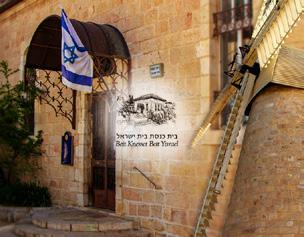
1unitravel.brokersnexus.com
1UniSim - Sims for USA and Worldwide Starting at $40 sales@1unisim.com



